Resume builder

The Best Research Skills for a Resume
If you want to apply for a research position, you need to provide evidence of research skills on your resume. In this article, we explore what the best research skills for a resume are, why they are important and how to list them properly. We also provide a researcher resume sample to get you started – you can use it as inspiration or a template.

Table of Contents
What Are Research Skills?
A career like research is an excellent option for anyone who can collect, analyze and interpret data, solve complex problems, dive deep into discovery, and offer innovative solutions. The best thing about being a researcher is that you can not only succeed in science and academia but also climb up the career ladder in the corporate world. Indeed, having solid research skills opens the door to many roles and industries, including academic environments, government settings, transnational corporations, startups, tech giants, and non-profit organizations, to name but a few.
From human behavior to regional studies to biotech, there are myriads of research spheres where a qualified individual can make a difference. Researchers utilize their skills to explore a variety of topics, and if you have your mind set on pursuing a career as a researcher, you need to understand what skill set is pivotal for success in this field.
In a nutshell, research skills are all about searching ways to resolve problems. They are knowledge, abilities and competencies that ensure you can investigate particular topics, perform critical analysis, extract and organize data, interpret results, form hypotheses, and derive data-driven conclusions.
As a researcher, you are expected to be capable of relaying your findings to other people in a compelling and digestible form and even inspire action, both in yourself and in others.
Whether you are a seasoned researcher or a novice in this field, you need to put the right skills on your resume . Below you will find a list of the most in-demand research skills in today’s job market.
The Top 10 Research Skills for a Resume
Communication.
Communication is a crucial aspect of a research career since you are required to share information, relay findings and spread knowledge efficiently and effectively, both orally and in writing . While communication skills certainly have a place on your resume , that doesn’t mean adding “Communication” to your list of skills is enough to move on. You need to provide relevant examples verifying that you can research things as part of a team and work towards a common goal. You could add something like this to add credibility to your claim:
Recruited 7 research assistants for clinical studies by visiting clinics and sending out email invites, increasing participation by 20%.
Explained 100+ research procedures to a group of study participants in 10 days, resulting in a 0% incident rate.
Problem Solving
Being an advanced problem solver means you can consistently identify issues and find effective and efficient solutions to them . It is an extremely valuable skill when it comes to research-based activities, and 86% of employers look for workers who are capable of solving problems in the workplace according to the National Association of Colleges and Employers’ Job Outlook 2022 survey. If you want to add problem-solving skills to your resume, you need to underpin them with relevant accomplishments. For instance, you could add examples like these:
Resolved course accessibility issues by creating interactive presentations for remote learners, increasing student satisfaction by 89%.
Developed and introduced a new computing environment for analysis, identifying 100% of failure patterns and improving issue detection by 75%.
Analytical Skills
Having analytical skills means you can parse data into digestible pieces, interpret them correctly and make data-based connections and conclusions . Data analysis incorporates a vast set of competencies, including technical skills like proficiency in programming languages, such as Python and R, familiarity with data visualization tools, like Tableau and Power BI, and a strong grasp of statistical analysis methods, such as hypothesis testing, regression analysis, and sample size determination. Armed with these skills, a researcher can take data to the next level and drive both innovation and profitability.
Being able to make sense of facts and figures both manually and using automated solutions will help you thrive in most roles, so recruiters would love to know that you are an analytical thinker when considering your candidacy. Your best bet here is to make sure they can find this out by examining your resume. You can add examples like the ones below to prove you can tackle complicated issues using your analytical skill set:
Collected, cleaned and analyzed first-party data from 10+ departments to identify the socio-economic impact of the COVID-19 pandemic on the company.
Performed regression analysis to determine the effects of a company-wide minimum wage increase, concluding that the hiring process was accelerated by 25% due to the wage change in question.
Qualitative Analysis
Qualitative analysis allows you to analyze a research subject using non-numerical and non-quantifiable parameters, characteristics and indicators and is based on abstract concepts . For instance, you can use qualitative attributes like human behavior or brand reputation to make business decisions or recognize investment opportunities. This skill is in demand today as it helps researchers use their observations to make conclusions, identify patterns and tackle challenges. Since you cannot quantify this area of your expertise, you need to provide relevant context to convince the reader that you are capable of analyzing non-tangible aspects of a subject. You can do that by using appropriate examples, like the following ones:
Evaluated the quality and accuracy of 200+ data sources in a month.
Performed quality control of high-volume content in a rapidly changing environment, maintaining a quality score of 99.9%.
Quantitative Analysis
Quantitative analysis is an approach that allows you to collect, study, measure, and analyze data . From statistical research to financial modeling, quantitative analysis includes a powerful toolkit that helps a researcher refine and simplify vast amounts of raw data to make better decisions and forecast trends.
Quantitative analysis has countless applications: with it, you can track metrics, measure variables and evaluate parameters in multiple fields, from finance and accounting to molecular biology and astrophysics. Therefore, it is no wonder that it is one of the most important research skills for a resume and highlighting it the right way is likely to help you move forward in the job searching process. You can prove that you know how to work with tangible data by providing relevant examples, like the following ones:
Designed a new data analysis technique, saving 30 monthly hours in parameter comparisons.
Used SQL to analyze customer data and identify areas for improvement related to customer conversions, resulting in a conversion boost by 75%.
Academic Writing
Academic writing is the ability to create complex documents containing scientific data, such as formulas, graphs, and charts . Academic writing skills help researchers prepare reports, presentations and articles for scientific journals and magazines, and if you have them, it means you know how to present technical information clearly and concisely. Recruiters from scientific fields are especially interested in candidates capable of writing academically, so submitting a resume with examples of written work is likely to help you secure a position as a researcher. Listing your publications to prove your expertise is the best option here, but since you might not have enough space to add all your papers, books and articles, you could highlight your academic writing proficiency with something like this:
Created 350+ articles on the principles of academic research for the university’s database, increasing student satisfaction by 60%.
Published 30+ papers focused on structural changes in protein conformations.
Literature Review
Literature review is a methodology that implies conducting rigorous research on a particular topic . Having literature review skills means you can explore your subject area in greater depth using sources like books, journal articles, industry magazines, etc. Such competencies allow you to build upon existing knowledge and generate new ideas, accelerating your research and pushing it to its full potential. Naturally, your literature review skills are a valuable asset to your resume. We recommend you to illuminate them with appropriate examples, focusing on tangible outcomes:
Gathered and reviewed 10+ articles on Stata to extract variables from a dataset.
Performed 100+ literature reviews to implement changes in clinical practice, boosting quality of care by 70%.
Time Management
Time management is a powerful soft skill that is especially valuable in research environments. It allows you to manage your time effectively, break large tasks into manageable chunks and prioritize them properly, set up measurable, attainable, and time-bound goals, and even juggle your responsibilities . Proper time management helps you stay focused on your work, boosts your productivity and thereby leads to consistently high results and impressive outcomes. From carrying out experiments to writing reports to teaching, as a researcher, you need to apply time management strategies on a daily basis to successfully accomplish your tasks. You can show you are good at time management on your resume by showcasing your successes, like in the examples below:
Developed a database for organizing behavioral data for 100+ study participants, decreasing data processing time by 30%.
Implemented data analysis techniques in Python, increasing the amount of data analyzed per hour by 17% and accelerating project completion by 40%.
Attention to Detail
Paying attention to detail is a vital aspect of being a researcher. Having this skill helps you gather credible information, perceive meaningful connections, notice discrepancies, and deliver high-quality work based on correct evidence. Since each and every aspect of a career in research requires efficiency and trustworthiness, attention to detail is something you cannot go without – otherwise, your progress will come to a screeching halt. Naturally, you need to illuminate this skill on your resume as recruiters seek candidates who can look at details with a critical eye and minimize distractions. And the best way to do that is by providing a relevant example of success. You can use the ones below for reference:
Checked 10 + data sheets for completion and quality per day, resulting in a <1% error rate.
Supervised the maintenance and updates of the lab’s database with a 99% accuracy rate.
Editing & Proofreading
Editing and proofreading skills are essential to perform successful research since they ensure it is both accurate and easy to read . While editing is more about making your text more digestible and improving the overall quality of your writing, proofreading corrects surface issues like errors in spelling, punctuation and grammar. Both require you to have a solid command of the language you use and a certain degree of focus. The devil is indeed in the details, so you need to always polish your texts before submitting them. Only this way will they be perceived by your peers and superiors as constructive and professional. And to prove you are good at editing and proofreading, you need to add appropriate examples to your resume. Here is how you can demonstrate your ability to provide high-quality texts:
Edited 11 federal grant proposals designed by my team, which generated $200+ in lab funding.
Edited a research paper co-authored with 2 postdoctoral employees regarding protein generation, which received the Best Paper Award in 2020.
How to List Research Skills on a Resume
Your resume is the best place to highlight your research experience and the value you could bring to your next role. The key here is to put your research skills in the right section so that they get noticed by the reader. You have no fewer than 7 options here:
- A dedicated research section
- Your work experience section
- The education section
- The list of your research publications
- The projects section
- The skills section
- Your resume summary
If you have a solid research background, you may want to create a separate section on your resume and call it Research or Research Experience . This place will help you expand on your projects and their details, specify the nature of your research, and describe the specifics of your previous roles, providing relevant examples and demonstrating the most prominent accomplishments.
If your career is all things research, the work/professional experience section can incorporate your research skills and accomplishments. List your employers and your duties, along with the dates of your employment, like you would do when describing your non-research work experience.
Your education section is an appropriate place to highlight your research skills if you are a student or a recent graduate. You can put it at the top of your resume if you want to draw more attention to your research background when applying for your first job in science or academia.
If you have a whole host of published works, it could be a great idea to create a separate section for listing your publications . This will help you add credibility to your research skills and accomplishments. Research-related accomplishments can also be highlighted as projects on your resume. This might be appropriate if your research background is not so extensive or not quite relevant to your current career aspirations.
You can list your research skills in your skills section as long as they are tangible and relevant for the job you want to land. We recommend you to avoid general skills here and focus on industry-specific expertise, illuminating it with the keywords you can find in the corresponding job listing and relevant skill levels .
Highlighting your research skills in the summary section is appropriate if you are applying for a role where a robust research background is essential. Your resume summary is just a few lines appearing at the top of the document, so make sure to add only the most important research skills there – those that you want the reader to see first and foremost.
Why Are Research Skills Important?
Research-oriented positions and most jobs in academia require you to have a solid set of research skills. Employees outside these roles can also benefit from research experience – research skills are transferable , meaning you can bring them to the table no matter your position, career field or job level. Therefore, they are a valuable addition to a resume in many cases.
Businesses and organizations are eager to employ candidates with proven research skills because they can
- come up with original plans and ideas,
- design innovative products and services,
- improve processes,
- keep up with technology,
- identify customers’ needs and requirements and find ways to meet them,
- resolve complicated issues,
- analyze competitors’ strengths and weaknesses,
By adding research skills to your resume, you show recruiters that you can think outside the box, know how to work with data and technology, are capable of making well-informed decisions, and are good at solving problems. This makes you a valuable hire in today’s skill-based job market
A Resume Sample to Apply for a Research Position
JOHN/JANE DOE Research Assistant Location ⋅ Email ⋅ Phone number Diligent and hardworking clinical researcher seeking a position at [Name of Company] to apply academic expertise and facilitate biological research. PROFESSIONAL EXPERIENCE Company/Organization, Location Dates of Employment Research Assistant Assisted scientists in 30+ research projects related to therapeutics for COVID-19 Conducted data-driven testing with an accuracy rate of 98% Supervised a team of 3 junior research assistants with daily laboratory duties Company/Organization, Location Dates of Employment Graduate Research Assistant Participated in cell research projects as part of a cross-departmental team of 30 researchers. Performed cell counts with 99% accuracy Was engaged in developing a platform to investigate immune responses to virus-infected hepatocytes. … Company/Organization, Location Dates of Employment Research Student Assistant Gathered and analyzed data and evidence for 10+ clinical research cases monthly. Awarded “Research Impact Award” in recognition of consistent research excellence (only 1 student is awarded in a class of 100). … EDUCATION NAME OF UNIVERSITY Location Degree, Major Dates of Education SKILLS Molecular cloning RNA isolation Cell counting Knowledge of SQL code and queries Data analysis Literature review
A career in research is an extremely exciting yet quite a demanding path. Since the competition for positions in the field is very fierce, as a researcher, you need to have high levels of determination and persistence and a powerful combination of skills. The research skills we have outlined in this article are what recruiters expect to see on your resume, so make sure to expand on them to get the job of your dream, rise to the top of your game and deliver ground-breaking research.
Leave a Reply Cancel reply
Your email address will not be published. Required fields are marked *
Save my name, email, and website in this browser for the next time I comment.
- Resume Tips
How to Include Research On A Resume (Examples and Tips)

Research skills are highly prized across a wide spectrum of industries. The fact is that researchers are invaluable for many employers. After all, new ideas often come only after exhaustive analysis of existing practices. Is it any surprise then that many of the most innovative companies in the world look for employees who possess these skills?
The good news is that most of us possess at least some skill in researching. Unfortunately, too many of us don’t recognize those skills or why they matter to employers. In this post, we’ll help you identify your research skills and show you how to include them on a resume.
What Are Research Skills?
Research skills are all those skills needed to investigate and analyze a subject and then communicate your findings to others. In short, there is no simple easily-defined skill that encompasses all these talents. Instead, your ability to research involves the effective use of a range of other skills.
Most of these skills relate to critical thinking in some way. They involve accumulating information and using it to draw reasoned conclusions. Naturally, those conclusions need to be conveyed to others with effective communication skills.
Research skills are among the most highly-prized transferable skills employers are looking for in today's competitive job market.
Employers value these skills because they are essential to progress. Innovation only comes from research and inspired insight. As a result, companies that rely on innovation to remain competitive tend to rely on employees who are talented researchers. Obviously, there are entire fields of industry that use researchers only for that purpose. In a more general sense, however, research skills are widely used by many different types of employees. And they use them in almost every industry in the marketplace.
How to List Research on a Resume
Including research on your resume:.
For research, summarize your accomplishments in a brief section. You should include a description of your role in the research, the topic that you were exploring, and some information about your findings. For example,
_ Research Project , Economics Department, Dynamic University, Dec 2017 – Apr 20_20
Key participant in research project examining blockchain technology’s potential impact on financial intermediation. Explored use case studies for cross-border payment systems, intrabank transactions, and microtransactions for e-commerce.
Designed model simulation to study blockchain-based payment system
Worked in tandem with Alpha and Delta Finance to create simulated intrabank transfers using digitalized tokens
Studied e-commerce script integration for cryptocurrency payments
Member of 3-person team tasked with presenting findings to 2018 National Banking Technology Conference
Example of Research Listed On a Resume:
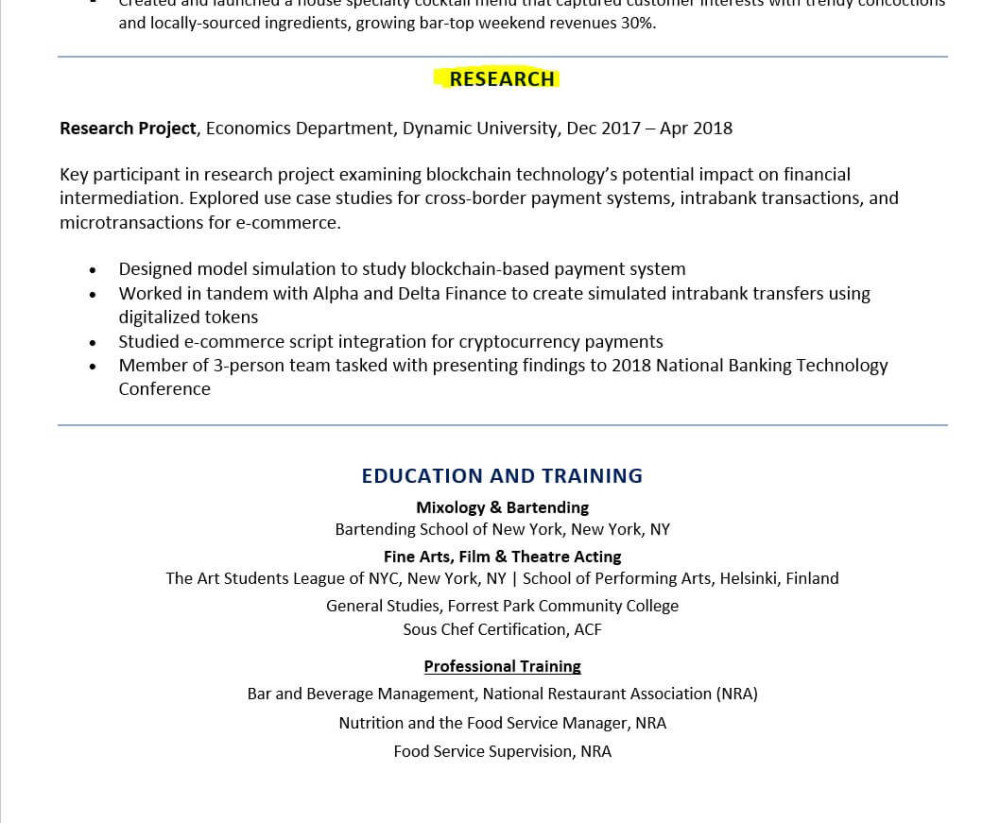
View 200+ more professional resume samples for all industries, along with a guide to writing resumes from our career experts.
You can also combine your research with other sections:
Research and Publications
Research and Professional Development
Educations and Research
We wrote a good post here on how to include publications on a resume.

Join more than 1 million people who have already received our complimentary resume review.
In 48 hours, you will know how your resume compares. We’ll show you what’s working--and what you should fix.
Some Important Research Skills You May Already Possess
When listing research skills on your resume, it’s important to remember that most of them won’t be core skills for the job you’re seeking. Unless you’re applying for a job as a researcher, these skills will basically be transferable skills. That means that they might not be essential for the position but will certainly enhance your value as a potential employee.
To better understand your own research skills, it’s important to be able to identify them.
Here are some common and valuable research skills that many employees possess. Chances are that you have used at least some of these skills in your career. For example:
Attention to detail. This seemingly simple skill is one that employers truly appreciate. People who possess an ability to note even the smallest details can be invaluable for identifying problems and creating solutions.
Planning and scheduling skills. Every research project starts with a plan and a schedule. This is also one of those transferable skills that has application throughout nearly every industry.
Data collection skills. Good research depends upon good data. If you’re a skilled data collector, that talent will be useful for any company’s research needs.
Problem-solving skills. At some level, all research is about solving problems. Whether it’s a graduate thesis or a corporate study, there’s always a question that needs to be answered.
Technical skills . Proficiency with computers and other technology is an essential skill for modern research.
Critical thinking skills. Data collection is useless if no one ever considers what that data means. That analysis requires critical thinking and the ability to analyze and draw conclusions.
Project management skills. Can you manage projects in an orderly and effective way? Every research project requires effective management.
Communication skills . Whether it’s an oral presentation or a written report, research findings always need to be communicated to others.
Make Your Research Skills Work for You
Finally, do more than just list your research skills in your resume. Put them to use. Research the company you’re trying to join, and mention things you’ve learned in your cover letter and interview. That can not only showcase your research abilities but will demonstrate your real desire to join their team. In the end, that can be the best way to improve your odds of landing that great job you need.
Related posts:
Writing Your Education Section: Samples & How to Guide
How To Find A Job Fast
ZipJob Team
The ZipJob team is made up of professional writers and career experts located across the USA and Canada with backgrounds in HR, recruiting, career coaching, job placement, and professional writing.
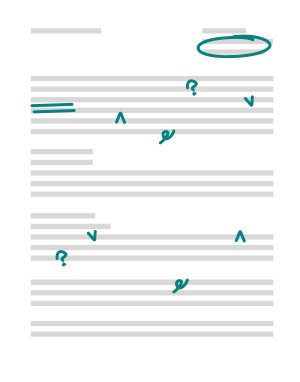
Is your resume working?
Find out with a free review from ZipJob.
Get a free resume review today
Our experts will review your resume’s grammar, layout, and ability to pass ATS — all free and delivered straight to your inbox.
PROTECT YOUR DATA
This site uses cookies and related technologies for site operation, and analytics as described in our Privacy Policy. You may choose to consent to our use of these technologies, reject non-essential technologies, or further manage your preferences.
- Resume Templates
- Resume Examples
- Free Resume Builder
- How to Write a Resume
- Resume Format
- Resume Packs
- Cover Letter Templates
- Cover Letter Examples
- Free Cover Letter Generator
- How To Write a Cover Letter
- CV Templates
- CV Examples
- Free CV Maker
- Resume Help
- Cover Letter Help
- Job Interview
- Career Advice
How to Put Research on a Resume: Tips and Examples
When most people think of research, they think of scientists in labs or graduate students trying to complete a thesis or dissertation. The truth is research comes in many types and forms.
Have you ever analyzed how target audiences interact with your product? Have you ever cross-checked product prices among the competition or compared which features their applications have? That’s also research.
The point is this: Many organizations are looking for people with strong analytical skills and research experience, even in areas that do not directly relate to the product or service they provide. Why? Because “research” is a skill that carries over into all academic, scientific, and business endeavors.
So whenever you’re perusing job posts, always check if mentioning your research experience may be helpful. If so, you will need to know how to include your research experience on a resume.
How to Put Research Experience on Resume?
Research experience belongs to the Work Experience section of your resume. Depending on your field of work, you can either mention some of your research skills when describing your work duties and accomplishments.
Or, if you’re working on a scientific resume for an academic position, you can set up a separate Research section on your resume (or even share your research work as a separate attachment).
At any rate, your research experience must be presented in a logical and coherent manner. Here’s how you put research on your resume:
- List all research work you have done previously, no matter what kind it may have been. It may have been academic research from your schooling. It may have been market research you did in your previous positions.
- Take a lingering look at the job description for the role you’re after. Scan the applicant requirements section for specific research skills.
- Cherry-pick the most relevant research experiences to include in your resume (yes, every resume has to be customized to the job description!).
- Include all your research directly in the sections of your resume that summarize your current and previous positions. If you can quantify the results of your research, do so. Employers like to see actual numbers.
Sample Entry for Research Experience on a Resume
Let’s say you’re after a Product Marketing Manager position with a SaaS company. The job ad says they’re looking for candidates, experienced in doing market research, segmented customer demographics studies, and brand messaging split testing. You have those skills. Here is how you might include them in your resume.
XYZ Corp. 2018-Present Position: Market Researcher Responsible for analysis of customer satisfaction with current products
- Conduct product satisfaction surveys on a weekly basis
- Analyze survey results using Power BI tools to understand the trends in user engagement, satisfaction, and attrition.
- Source additional qualitative data from customer support and sales teams to provide a more comprehensive analysis.
- Collaborate with the Product Owner and Program Manager on inputs for new product features.
ABC Corp. 2018-2019 Position: CRO Specialist Responsible for conceptualizing and implementing CRO strategies for e-commerce websites.
- Google Analytics, heatmaps, and session recording data to create conversion benchmarks for main landing pages.
- Make recommendations for changes in microcopy, CTA placements, and information layouts, page-by-page.
- Have improved the conversation rate by 23% for an international food retailer.
- Generated over $100K in revenue from one promotional landing page for a coffee retailer.
Sample Undergraduate Research on Resume
Here’s another option: You want to talk about relevant coursework in college. Any research you did as an undergraduate related to your career can be relevant, especially when you’re an entry-level candidate.
Again, read the job posting carefully, and see what will fit. Here’s a sample of how you can include it on your resume.
Education University of Missouri 2020 BS in Agriculture
Additional Information: Research Project
Conducted original research on the effects of phosphorus and nitrogen in soil samples on the growth of corn. Concluded with recommendations for percentages of each in the soil to achieve maximum growth.
How to Put Research Skills on Your Resume
First, understand this: Research experience and research skills are two very different things. Experience is actual research work that you have done. Skills indicate your ability to conduct research.
So you’ll want to list your skills separately from your academic or work projects. A good way to do so is by creating a featured skills section on your resume. Depending on the resume template you use, you can locate it in the sidebar area or header.
Good Research Skills for a Resume
Need some ideas? Here are several examples of resume-worth research skills:
- Research question development
- Field data collection
- Data aggregation and analysis
- Statistical models in Matlab
- Custom analytics projects in PyTorch
- Customer survey development
- Interview techniques
- Qualitative research design
- Experiment designs
Research experience is an important qualifier for so many career positions today. If you feel comfortable working with data and know a thing or two about statistical analysis, your value to any employer increases manyfold. So always give your research skills a prominent placement on your resume!

Elena runs content operations at Freesumes since 2017. She works closely with copywriters, designers, and invited career experts to ensure that all content meets our highest editorial standards. Up to date, she wrote over 200 career-related pieces around resume writing, career advice... more
you might also like

6 Best Colors For Your Resume (According to Pro Designers)

How to Put an Internship on a Resume: FAQs Answered

Resume Skills For Retail: Big List of Examples

90+ Childcare Skills For Your Resume (+ Daycare Worker Resume Example!)

The Ultimate List of Nursing Skills For a Resume
Leave a response cancel reply.
Explore Jobs
- Jobs Near Me
- Remote Jobs
- Full Time Jobs
- Part Time Jobs
- Entry Level Jobs
- Work From Home Jobs
Find Specific Jobs
- $15 Per Hour Jobs
- $20 Per Hour Jobs
- Hiring Immediately Jobs
- High School Jobs
- H1b Visa Jobs
Explore Careers
- Business And Financial
- Architecture And Engineering
- Computer And Mathematical
Explore Professions
- What They Do
- Certifications
- Demographics
Best Companies
- Health Care
- Fortune 500
Explore Companies
- CEO And Executies
- Resume Builder
- Career Advice
- Explore Majors
- Questions And Answers
- Interview Questions
The Most Important Research Skills (With Examples)
- What Are Hard Skills?
- What Are Technical Skills?
- What Are What Are Life Skills?
- What Are Social Media Skills Resume?
- What Are Administrative Skills?
- What Are Analytical Skills?
- What Are Research Skills?
- What Are Transferable Skills?
- What Are Microsoft Office Skills?
- What Are Clerical Skills?
- What Are Computer Skills?
- What Are Core Competencies?
- What Are Collaboration Skills?
- What Are Conflict Resolution Skills?
- What Are Mathematical Skills?
- How To Delegate
Find a Job You Really Want In
Research skills are the ability to find out accurate information on a topic. They include being able to determine the data you need, find and interpret those findings, and then explain that to others. Being able to do effective research is a beneficial skill in any profession, as data and research inform how businesses operate.
Whether you’re unsure of your research skills or are looking for ways to further improve them, then this article will cover important research skills and how to become even better at research.
Key Takeaways
Having strong research skills can help you understand your competitors, develop new processes, and build your professional skills in addition to aiding you in finding new customers and saving your company money.
Some of the most valuable research skills you can have include goal setting, data collection, and analyzing information from multiple sources.
You can and should put your research skills on your resume and highlight them in your job interviews.

What are research skills?
Why are research skills important, 12 of the most important research skills, how to improve your research skills, highlighting your research skills in a job interview, how to include research skills on your resume, resume examples showcasing research skills, research skills faqs.
- Sign Up For More Advice and Jobs
Research skills are the necessary tools to be able to find, compile, and interpret information in order to answer a question. Of course, there are several aspects to this. Researchers typically have to decide how to go about researching a problem — which for most people is internet research.
In addition, you need to be able to interpret the reliability of a source, put the information you find together in an organized and logical way, and be able to present your findings to others. That means that they’re comprised of both hard skills — knowing your subject and what’s true and what isn’t — and soft skills. You need to be able to interpret sources and communicate clearly.
Research skills are useful in any industry, and have applications in innovation, product development, competitor research, and many other areas. In addition, the skills used in researching aren’t only useful for research. Being able to interpret information is a necessary skill, as is being able to clearly explain your reasoning.
Research skills are used to:
Do competitor research. Knowing what your biggest competitors are up to is an essential part of any business. Researching what works for your competitors, what they’re doing better than you, and where you can improve your standing with the lowest resource expenditure are all essential if a company wants to remain functional.
Develop new processes and products. You don’t have to be involved in research and development to make improvements in how your team gets things done. Researching new processes that make your job (and those of your team) more efficient will be valued by any sensible employer.
Foster self-improvement. Folks who have a knack and passion for research are never content with doing things the same way they’ve always been done. Organizations need independent thinkers who will seek out their own answers and improve their skills as a matter of course. These employees will also pick up new technologies more easily.
Manage customer relationships. Being able to conduct research on your customer base is positively vital in virtually every industry. It’s hard to move products or sell services if you don’t know what people are interested in. Researching your customer base’s interests, needs, and pain points is a valuable responsibility.
Save money. Whether your company is launching a new product or just looking for ways to scale back its current spending, research is crucial for finding wasted resources and redirecting them to more deserving ends. Anyone who proactively researches ways that the company can save money will be highly appreciated by their employer.
Solve problems. Problem solving is a major part of a lot of careers, and research skills are instrumental in making sure your solution is effective. Finding out the cause of the problem and determining an effective solution both require accurate information, and research is the best way to obtain that — be it via the internet or by observation.
Determine reliable information. Being able to tell whether or not the information you receive seems accurate is a very valuable skill. While research skills won’t always guarantee that you’ll be able to tell the reliability of the information at first glance, it’ll prevent you from being too trusting. And it’ll give the tools to double-check .
Experienced researchers know that worthwhile investigation involves a variety of skills. Consider which research skills come naturally to you, and which you could work on more.
Data collection . When thinking about the research process, data collection is often the first thing that comes to mind. It is the nuts and bolts of research. How data is collected can be flexible.
For some purposes, simply gathering facts and information on the internet can fulfill your need. Others may require more direct and crowd-sourced research. Having experience in various methods of data collection can make your resume more impressive to recruiters.
Data collection methods include: Observation Interviews Questionnaires Experimentation Conducting focus groups
Analysis of information from different sources. Putting all your eggs in one source basket usually results in error and disappointment. One of the skills that good researchers always incorporate into their process is an abundance of sources. It’s also best practice to consider the reliability of these sources.
Are you reading about U.S. history on a conspiracy theorist’s blog post? Taking facts for a presentation from an anonymous Twitter account?
If you can’t determine the validity of the sources you’re using, it can compromise all of your research. That doesn’t mean just disregard anything on the internet but double-check your findings. In fact, quadruple-check. You can make your research even stronger by turning to references outside of the internet.
Examples of reliable information sources include: Published books Encyclopedias Magazines Databases Scholarly journals Newspapers Library catalogs
Finding information on the internet. While it can be beneficial to consulate alternative sources, strong internet research skills drive modern-day research.
One of the great things about the internet is how much information it contains, however, this comes with digging through a lot of garbage to get to the facts you need. The ability to efficiently use the vast database of knowledge that is on the internet without getting lost in the junk is very valuable to employers.
Internet research skills include: Source checking Searching relevant questions Exploring deeper than the first options Avoiding distraction Giving credit Organizing findings
Interviewing. Some research endeavors may require a more hands-on approach than just consulting internet sources. Being prepared with strong interviewing skills can be very helpful in the research process.
Interviews can be a useful research tactic to gain first-hand information and being able to manage a successful interview can greatly improve your research skills.
Interviewing skills involves: A plan of action Specific, pointed questions Respectfulness Considering the interview setting Actively Listening Taking notes Gratitude for participation
Report writing. Possessing skills in report writing can assist you in job and scholarly research. The overall purpose of a report in any context is to convey particular information to its audience.
Effective report writing is largely dependent on communication. Your boss, professor , or general reader should walk away completely understanding your findings and conclusions.
Report writing skills involve: Proper format Including a summary Focusing on your initial goal Creating an outline Proofreading Directness
Critical thinking. Critical thinking skills can aid you greatly throughout the research process, and as an employee in general. Critical thinking refers to your data analysis skills. When you’re in the throes of research, you need to be able to analyze your results and make logical decisions about your findings.
Critical thinking skills involve: Observation Analysis Assessing issues Problem-solving Creativity Communication
Planning and scheduling. Research is a work project like any other, and that means it requires a little forethought before starting. Creating a detailed outline map for the points you want to touch on in your research produces more organized results.
It also makes it much easier to manage your time. Planning and scheduling skills are important to employers because they indicate a prepared employee.
Planning and scheduling skills include: Setting objectives Identifying tasks Prioritizing Delegating if needed Vision Communication Clarity Time-management
Note-taking. Research involves sifting through and taking in lots of information. Taking exhaustive notes ensures that you will not neglect any findings later and allows you to communicate these results to your co-workers. Being able to take good notes helps summarize research.
Examples of note-taking skills include: Focus Organization Using short-hand Keeping your objective in mind Neatness Highlighting important points Reviewing notes afterward
Communication skills. Effective research requires being able to understand and process the information you receive, either written or spoken. That means that you need strong reading comprehension and writing skills — two major aspects of communication — as well as excellent listening skills.
Most research also involves showcasing your findings. This can be via a presentation. , report, chart, or Q&A. Whatever the case, you need to be able to communicate your findings in a way that educates your audience.
Communication skills include: Reading comprehension Writing Listening skills Presenting to an audience Creating graphs or charts Explaining in layman’s terms
Time management. We’re, unfortunately, only given 24 measly hours in a day. The ability to effectively manage this time is extremely powerful in a professional context. Hiring managers seek candidates who can accomplish goals in a given timeframe.
Strong time management skills mean that you can organize a plan for how to break down larger tasks in a project and complete them by a deadline. Developing your time management skills can greatly improve the productivity of your research.
Time management skills include: Scheduling Creating task outlines Strategic thinking Stress-management Delegation Communication Utilizing resources Setting realistic expectations Meeting deadlines
Using your network. While this doesn’t seem immediately relevant to research skills, remember that there are a lot of experts out there. Knowing what people’s areas of expertise and asking for help can be tremendously beneficial — especially if it’s a subject you’re unfamiliar with.
Your coworkers are going to have different areas of expertise than you do, and your network of people will as well. You may even know someone who knows someone who’s knowledgeable in the area you’re researching. Most people are happy to share their expertise, as it’s usually also an area of interest to them.
Networking involves: Remembering people’s areas of expertise Being willing to ask for help Communication Returning favors Making use of advice Asking for specific assistance
Attention to detail. Research is inherently precise. That means that you need to be attentive to the details, both in terms of the information you’re gathering, but also in where you got it from. Making errors in statistics can have a major impact on the interpretation of the data, not to mention that it’ll reflect poorly on you.
There are proper procedures for citing sources that you should follow. That means that your sources will be properly credited, preventing accusations of plagiarism. In addition, it means that others can make use of your research by returning to the original sources.
Attention to detail includes: Double checking statistics Taking notes Keeping track of your sources Staying organized Making sure graphs are accurate and representative Properly citing sources
As with many professional skills, research skills serve us in our day to day life. Any time you search for information on the internet, you’re doing research. That means that you’re practicing it outside of work as well. If you want to continue improving your research skills, both for professional and personal use, here are some tips to try.
Differentiate between source quality. A researcher is only as good as their worst source. Start paying attention to the quality of the sources you use, and be suspicious of everything your read until you check out the attributions and works cited.
Be critical and ask yourself about the author’s bias, where the author’s research aligns with the larger body of verified research in the field, and what publication sponsored or published the research.
Use multiple resources. When you can verify information from a multitude of sources, it becomes more and more credible. To bolster your faith in one source, see if you can find another source that agrees with it.
Don’t fall victim to confirmation bias. Confirmation bias is when a researcher expects a certain outcome and then goes to find data that supports this hypothesis. It can even go so far as disregarding anything that challenges the researcher’s initial hunch. Be prepared for surprising answers and keep an open mind.
Be open to the idea that you might not find a definitive answer. It’s best to be honest and say that you found no definitive answer instead of just confirming what you think your boss or coworkers expect or want to hear. Experts and good researchers are willing to say that they don’t know.
Stay organized. Being able to cite sources accurately and present all your findings is just as important as conducting the research itself. Start practicing good organizational skills , both on your devices and for any physical products you’re using.
Get specific as you go. There’s nothing wrong with starting your research in a general way. After all, it’s important to become familiar with the terminology and basic gist of the researcher’s findings before you dig down into all the minutia.
A job interview is itself a test of your research skills. You can expect questions on what you know about the company, the role, and your field or industry more generally. In order to give expert answers on all these topics, research is crucial.
Start by researching the company . Look into how they communicate with the public through social media, what their mission statement is, and how they describe their culture.
Pay close attention to the tone of their website. Is it hyper professional or more casual and fun-loving? All of these elements will help decide how best to sell yourself at the interview.
Next, research the role. Go beyond the job description and reach out to current employees working at your desired company and in your potential department. If you can find out what specific problems your future team is or will be facing, you’re sure to impress hiring managers and recruiters with your ability to research all the facts.
Finally, take time to research the job responsibilities you’re not as comfortable with. If you’re applying for a job that represents increased difficulty or entirely new tasks, it helps to come into the interview with at least a basic knowledge of what you’ll need to learn.
Research projects require dedication. Being committed is a valuable skill for hiring managers. Whether you’ve had research experience throughout education or a former job, including it properly can boost the success of your resume .
Consider how extensive your research background is. If you’ve worked on multiple, in-depth research projects, it might be best to include it as its own section. If you have less research experience, include it in the skills section .
Focus on your specific role in the research, as opposed to just the research itself. Try to quantify accomplishments to the best of your abilities. If you were put in charge of competitor research, for example, list that as one of the tasks you had in your career.
If it was a particular project, such as tracking the sale of women’s clothing at a tee-shirt company, you can say that you “directed analysis into women’s clothing sales statistics for a market research project.”
Ascertain how directly research skills relate to the job you’re applying for. How strongly you highlight your research skills should depend on the nature of the job the resume is for. If research looks to be a strong component of it, then showcase all of your experience.
If research looks to be tangential, then be sure to mention it — it’s a valuable skill — but don’t put it front and center.
Example #1: Academic Research
Simon Marks 767 Brighton Blvd. | Brooklyn, NY, 27368 | (683)-262-8883 | [email protected] Diligent and hardworking recent graduate seeking a position to develop professional experience and utilize research skills. B.A. in Biological Sciences from New York University. PROFESSIONAL EXPERIENCE Lixus Publishing , Brooklyn, NY Office Assistant- September 2018-present Scheduling and updating meetings Managing emails and phone calls Reading entries Worked on a science fiction campaign by researching target demographic Organizing calendars Promoted to office assistant after one year internship Mitch’s Burgers and Fries , Brooklyn, NY Restaurant Manager , June 2014-June 2018 Managed a team of five employees Responsible for coordinating the weekly schedule Hired and trained two employees Kept track of inventory Dealt with vendors Provided customer service Promoted to restaurant manager after two years as a waiter Awarded a $2.00/hr wage increase SKILLS Writing Scientific Research Data analysis Critical thinking Planning Communication RESEARCH Worked on an ecosystem biology project with responsibilities for algae collection and research (2019) Lead a group of freshmen in a research project looking into cell biology (2018) EDUCATION New York University Bachelors in Biological Sciences, September 2016-May 2020
Example #2: Professional Research
Angela Nichols 1111 Keller Dr. | San Francisco, CA | (663)-124-8827 |[email protected] Experienced and enthusiastic marketer with 7 years of professional experience. Seeking a position to apply my marketing and research knowledge. Skills in working on a team and flexibility. EXPERIENCE Apples amp; Oranges Marketing, San Francisco, CA Associate Marketer – April 2017-May 2020 Discuss marketing goals with clients Provide customer service Lead campaigns associated with women’s health Coordinating with a marketing team Quickly solving issues in service and managing conflict Awarded with two raises totaling $10,000 over three years Prestigious Marketing Company, San Francisco, CA Marketer – May 2014-April 2017 Working directly with clients Conducting market research into television streaming preferences Developing marketing campaigns related to television streaming services Report writing Analyzing campaign success statistics Promoted to Marketer from Junior Marketer after the first year Timberlake Public Relations, San Francisco, CA Public Relations Intern – September 2013–May 2014 Working cohesively with a large group of co-workers and supervisors Note-taking during meetings Running errands Managing email accounts Assisting in brainstorming Meeting work deadlines EDUCATION Golden Gate University, San Francisco, CA Bachelor of Arts in Marketing with a minor in Communications – September 2009 – May 2013 SKILLS Marketing Market research Record-keeping Teamwork Presentation. Flexibility
What research skills are important?
Goal-setting and data collection are important research skills. Additional important research skills include:
Using different sources to analyze information.
Finding information on the internet.
Interviewing sources.
Writing reports.
Critical thinking.
Planning and scheduling.
Note-taking.
Managing time.
How do you develop good research skills?
You develop good research skills by learning how to find information from multiple high-quality sources, by being wary of confirmation bias, and by starting broad and getting more specific as you go.
When you learn how to tell a reliable source from an unreliable one and get in the habit of finding multiple sources that back up a claim, you’ll have better quality research.
In addition, when you learn how to keep an open mind about what you’ll find, you’ll avoid falling into the trap of confirmation bias, and by staying organized and narrowing your focus as you go (rather than before you start), you’ll be able to gather quality information more efficiently.
What is the importance of research?
The importance of research is that it informs most decisions and strategies in a business. Whether it’s deciding which products to offer or creating a marketing strategy, research should be used in every part of a company.
Because of this, employers want employees who have strong research skills. They know that you’ll be able to put them to work bettering yourself and the organization as a whole.
Should you put research skills on your resume?
Yes, you should include research skills on your resume as they are an important professional skill. Where you include your research skills on your resume will depend on whether you have a lot of experience in research from a previous job or as part of getting your degree, or if you’ve just cultivated them on your own.
If your research skills are based on experience, you could put them down under the tasks you were expected to perform at the job in question. If not, then you should likely list it in your skills section.
University of the People – The Best Research Skills for Success
Association of Internet Research Specialists — What are Research Skills and Why Are They Important?
MasterClass — How to Improve Your Research Skills: 6 Research Tips
How useful was this post?
Click on a star to rate it!
Average rating / 5. Vote count:
No votes so far! Be the first to rate this post.

Sky Ariella is a professional freelance writer, originally from New York. She has been featured on websites and online magazines covering topics in career, travel, and lifestyle. She received her BA in psychology from Hunter College.
Recent Job Searches
- Registered Nurse Jobs Resume Location
- Truck Driver Jobs Resume Location
- Call Center Representative Jobs Resume Location
- Customer Service Representative Jobs Resume
- Delivery Driver Jobs Resume Location
- Warehouse Worker Jobs Resume Location
- Account Executive Jobs Resume Location
- Sales Associate Jobs Resume Location
- Licensed Practical Nurse Jobs Resume Location
- Company Driver Jobs Resume
Related posts

Most Important Administrative Skills (With Examples)

50 Jobs That Use Powerpoint The Most
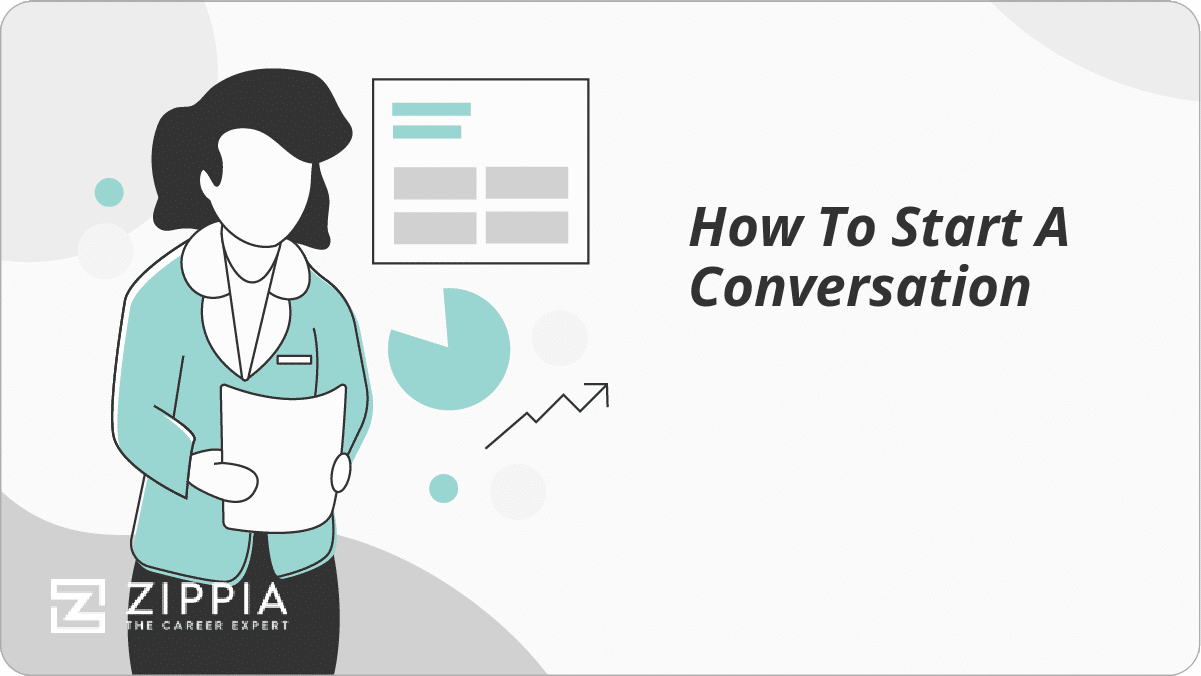
How To Start A Conversation: (55+ Examples For Every Situation + Tips)

50 Jobs That Use Payroll The Most
- Career Advice >
- Hard Skills >
- Research Skills
- Knowledge Base
- Free Resume Templates
- Resume Builder
- Resume Examples
- Free Resume Review
Should I include research experience on my resume?
If this is you debating whether or not you should include your research experience on your resume, you’ve come to the right place.
When it comes to landing your dream job, having relevant experience on your resume can make all the difference.
This is especially true in the field of research, where employers are often looking for candidates with strong skills and experience.
In fact, surveys show that 65% of recruiters prefer their candidates to have relevant work experience. when evaluating job candidates.
So if you are seeking jobs related to research, it is indeed crucial to showcase your research experience on your resume in a way that can help you stand out from other candidates and increase your chances of landing an interview.
In this article, we'll discuss the key strategies for highlighting your research experience on your resume, including the types of information to include, how to structure your resume, and other tips for effectively showcasing your skills and experience.
- What is research experience on a resume and why is research experience important?
- How to put research experience on a resume?
- Where to put research experience on a resume?
- What is an example of research experience?
What is Research Experience on Resume and Why is it Important?
Research experience refers to any experience you have had conducting research, whether as part of an academic course, an internship, or a job.
Depending on the industry, it could involve conducting literature reviews, collecting and analyzing data, performing experiments, and presenting research findings.
Research experience can be incredibly valuable in a variety of fields, including science, engineering, healthcare, education, and social sciences. It shows potential employers that you have the skills and expertise needed to work in a research-oriented role.
Including research experience on your resume can be highly advantageous. Here are some reasons why:
Demonstrates critical thinking and problem-solving skills: Research requires careful analysis and critical thinking, demonstrating your ability to approach complex problems and develop solutions.
Shows attention to detail: Conducting research often requires meticulous attention to detail and a focus on accuracy, qualities that are highly valued in many industries.
Highlights technical skills: Depending on the type of research you conducted, you may have developed technical skills, such as data analysis, statistical analysis, or programming.
Shows initiative and independence: Research often involves working independently and taking the initiative to design and execute research projects. This shows potential employers that you are self-motivated and can take the lead when necessary.
Also Read: How to write a research assistant resume in 2023?

How to Describe Research Experience on Resume?
To make the most of your research experience, it's important to know how to include it on your resume effectively. Here are some tips to help you get started:
Choose the Right Format
There are several different resume formats you can use, including chronological, functional, and combination formats.
When highlighting your research experience, the chronological format is typically the best choice. This format lists your research experience in reverse chronological order, starting with your most recent experience.
Tailor Your Resume to the Job Description
When crafting your resume, make sure to tailor your research experience to the job description you're applying for. This means highlighting the research experience that is most relevant to the position you're seeking.
For instance, if you're applying for a research position at a company, and the job description specifically mentions experience with qualitative research methods. You must highlight your experience with these research methods on your resume.
You can write, “Experienced in qualitative research methods, including in-depth interviews, focus groups, and content analysis.”
Use Action-Oriented Language
Ensure to use action-oriented language that emphasizes your accomplishments and responsibilities while describing your research experience on your resume.
This means you need to use strong verbs and quantify your achievements wherever possible. Here are a few examples:
- Instead of writing "Conducted research on topic X," write "Led a research project on topic X, resulting in a published paper in Journal Y."
- Rather than writing "Assisted with data analysis," write "Developed and implemented a data analysis plan that identified key trends and insights."
By using action-oriented language and emphasizing your specific accomplishments and skills, you can demonstrate to the employer that you're a proactive and results-driven candidate.
Thereby, helping you increase your chances of landing an interview and ultimately getting the job.
Highlight Your Technical Skills
If you developed technical skills through your research experience, make sure to highlight them on your resume.
This could include experience with statistical software, programming languages, or laboratory techniques.
Provide Specific Examples
Rather than blatantly listing your research experience on your resume, provide specific examples of your accomplishments and the results of your research.
This can help potential employers see the impact of your work and understand the skills you bring to the table better. It also adds credibility to your research skills and experiences.
Also Read: How to build a stellar academic resume?
Where to Put Research Experience on Resume?
When it comes to where to put research experience on your resume, there are a few options:
Under a "Research Experience" section: This is the most straightforward option and allows you to list your research experience and projects in a dedicated section. Be sure to include the project title, your role, the duration, and any relevant details such as methodology or results.
Under your "Experience" section: If your research experience is relevant to your previous jobs or internships, you can list it under the corresponding job entry. For example, if you conducted research as part of an internship or a job, you could include a bullet point under that entry that describes your research experience.
In a separate "Publications" or "Presentations" section: If you have published research papers or presented at conferences, you can include them in a separate section that highlights these accomplishments. Be sure to include the title of the paper or presentation, the conference or journal name, and the date.
Also Read: How to showcase work experience effectively in a resume in 2023?
Examples of Research Experience on Resumes
For your reference, given below are some examples of research experience on a resume:
- Conducted research on the effectiveness of a new cancer treatment, including developing research protocols, collecting and analyzing data, and presenting findings to a team of oncologists.
- Collaborated with a team of researchers to conduct a qualitative study on the experiences of women in STEM fields, including conducting interviews and focus groups, analyzing data using NVivo software, and presenting findings at a national conference.
- Completed an independent research project on the impact of social media on mental health, including conducting a literature review, designing and administering a survey, and analyzing data using SPSS software.
- Assisted a team of researchers in analyzing data from a large-scale epidemiological study, including cleaning and formatting data, running statistical analyses, and creating visualizations using R software.
- Participated in a summer research program, working with a mentor to conduct research on the impact of climate change on coastal ecosystems, including collecting and analyzing data, writing reports, and presenting findings at a research symposium.
- Conducted a research project as part of a senior thesis, exploring the relationship between exercise and cognitive function in older adults, including designing and implementing a study, collecting and analyzing data, and presenting findings at a departmental conference.
Also Read: What is the difference between a CV and a resume?
Key Takeaways
- What is research experience on a resume and why is it important?
Research experience encompasses conducting research in various settings, such as academic courses, internships, or jobs, which can provide critical thinking and problem-solving skills, attention to detail, technical skills, and show initiative and independence. By including research experience on a resume, potential employers can gain insight into the candidate's expertise, skills, and suitability for research-oriented roles, which can be beneficial in many industries.
- How to list research experience on a resume?
To highlight your research experience effectively, it is crucial to choose the right format, tailor your resume to the job description, use action-oriented language, highlight your technical skills, and provide specific examples of your accomplishments in your research.
There are 3 options when it comes to placing your research experience on your resume - a dedicated "Research Experience" section, your "Experience" section, or in a separate "Publications" or "Presentations" section. Wherever you decide to showcase them, ensure to include details like project title, duration, methodology, or results.
If you want to build a stellar resume that showcases your research experience perfectly, use Hiration’s ChatGPT-powered resume builder with 24x7 chat support. You can also reach us at [email protected] if you have any queries.

Share this blog
Subscribe to Free Resume Writing Blog by Hiration
Get the latest posts delivered right to your inbox
Stay up to date! Get all the latest & greatest posts delivered straight to your inbox
Is Your Resume ATS Friendly To Get Shortlisted?
Upload your resume for a free expert review.

University of Missouri
- Bias Hotline: Report bias incidents
Undergraduate Research
How to put research on your resumé.
Resumés are important documents for all kinds of application packages — jobs, scholarships, grad school, etc. Your resumé should fit within the total package highlighting your achievements in a concise manner that can be further expounded upon in your personal statement, cover letter, or your letters of reference. It is important to custom tailor your resumé to any particular position, or program you are applying for. Some information needs to be emphasized more than other depending on what the reviewers may be looking for.
Using Your Space Wisely
In general, a resumé should be no more than two pages long — unless you have a large number of presentations or publications that need to be listed. Avoid the tendency to add more “stuff” to your resumé to try to look impressive. Use the relevant experience you have and determine what was impressive about it (for example, demonstrated independence, innovation, grit, or tenacity; helped improve ways of doing things in the lab; were given additional responsibilities as time went on; etc.)
- A reviewer would rather read about the two positions you had that are relevant, than try to sift through seven or eight clubs or fast-food job descriptions.
- Transcript?
- Recommendation Letters?
- Personal Statement?
Typically, resumes are formatted so that your most recent position is listed first. However, don’t put working at Dairy Queen first, if you are applying for a research position. Instead, consider using some of the following sections:
- Academic Accomplishments
- Research Experience
- Work Experience/Employment
- College Activities
- Volunteer Work
- Presentations and Publications
You do not need all of these categories, especially if you do not have relevant, interesting, or recent experience with them. Do not feel forced to try to fit your resume into someone else’s template. Make a list of what you want to include then design categories that fit your experience and story. Keep in mind that these categories will change over time (for example: five years after college, you will no longer need to include a section on “college activities”).
Research Mentor
- Area of research
- Not only does it show that you worked directly with a faculty member in your position, but reviewers might be familiar with your mentor’s work which could put you at an advantage.
- Consider listing projects and accomplishments the group achieved first before breaking things out on a year to year basis.
- If you were funded by different sources at different times, put a list of these sources at the bottom of the experience in this position.
Job Titles, Time Periods
- Use something that makes sense (sometimes HR titles do not)
- Instead of “MUURS Scholar” say “Student Researcher funded by the MU Undergraduate Research Scholars Program”
- Summer 2017 (9 weeks, full time internship)
- Academic Year 2018-2019 (15 hrs/week)
- What does that award mean?
- Will anyone outside of campus know what that is?
- Was the program selective?
- What was the award amount?
- What was the duration of the award?
- You can list various funding sources at the end of the relevant section
- External funding (from a government entity such as NIH, for example) is impressive. Be sure to list it.
You need to take the time to seriously consider your experience and how that allowed you to grow and mature as a researcher. Ask yourself these questions when brainstorming about your experience:
- What are areas you excelled in?
- What are lessons you learned?
- What are things you improved upon from the person before you?
- How did you spend your time?
- What skills did you gain?
- What research outcomes were reached?
- How long were you in the lab?
Use specific numbers or other qualifiers when applicable to show just how much work, effort, independence, or tenacity you had.
If your publication and presentation experience is limited, it is recommended that you include it with your relevant experience. However, if you have extensive or otherwise impressive experience (won a presentation award at a conference, or presented your work to state legislators at the Undergraduate Research Day at the the State Capitol, for example) then include a new category specifically for Presentations and/or Publications.
Presentations
- Include full list of authors
- Include full and official title
- Include if it was poster or oral presentation (ie, 15 minute presentation)
- Include location, event
- Include date (at least month and year)
- Include any award
- Check in with your mentor, to find out if a poster you co-authored was presented elsewhere.
Publications
- Full citation when published
- In Press – journal, date?
- Submitted for review – journal/date
- In preparation
- Check with your mentor as many projects are not completed by the time as student graduates.
Final Reminders
- Know your audience
- Explain (or spell out)
- Organize to fit your own situation
- Make it easy to follow – esp. if you have ‘time away’
- But have on comprehensive and cohesive running resumé.
- Have a system in place to update/organize your resumés.
- Use professional language, as most files are submitted electronically — the reviewer will see if you named a file “Better Resumé”
- ex: Jane Doe Resumé – Biochemistry REU, UT Austin
- This will ensure that the reviewer knows who you are and what you are applying for without even opening the file.
We encourage students to visit the MU Career Center in the Student Success Center for help on their specific application needs.

- Self & Career Exploration
- Blue Chip Leadership Experience
- Experiential Learning
- Research Experiences
- Transferable Skills
- Functional Skills
- Resume, CV & Cover Letter
- Online Profiles
- Networking & Relationship Building
- Internships
- Interviewing
- Offer Evaluation & Negotiation
- Career Core by Kaplan
- Arts & Media
- Commerce & Management
- Data & Technology
- Education & Social Services
- Engineering & Infrastructure
- Environment & Resources
- Global Impact & Public Service
- Health & Biosciences
- Law & Justice
- Research & Academia
- Recent Alumni
- Other Alumni Interest Areas
- People of Color
- First Generation
- International
- Faculty & Staff
- Parents & Families
Tips for Adding Research to Your Resume
- Share This: Share Tips for Adding Research to Your Resume on Facebook Share Tips for Adding Research to Your Resume on LinkedIn Share Tips for Adding Research to Your Resume on X
Getting involved in research is a unique experience that can help you build important skill for school and beyond! Once you get started, it’s important to think about adding it to your resume. When applying to future research positions, jobs, internships, and/or graduate school, it’s important to show off your experience. You will want to show that you have this kind of experience and also show off the skills that you have used/developed in your research position.
What You Need to Include
Its important to summarize the basic details of each position on your resume so that whoever reads it understands what each position was before they even read your bullet points.
Your research experience should have; • Your Role/Title Example: Research Assistant, Student Lab Member, etc.
• Lab and University Name Example: Wildcat Lab, University of Arizona
• City/State, not the full address! Example: Tucson, AZ
• Start Month/Year – End Month/Year. Examples: February 2023 – Present | January 2022 – May 2022
Putting it all together! Research Assistant | Tucson, AZ Wildcat Lab, University of Arizona | February 2023 – Present
Next – Writing About Your Experience s
Writing about your experience is important because this is the part that shows off what you did in your research experience! It’s important to write in a way that shows off the skills you used in the role. This is why we recommend writing in a style called APR format.
APR stands for Action – Project/Problem – Results. This format gives the employer, or whoever is reading your resume, enough information to see what you did, which skills you used, and why or how the task was completed. You can review more about APR format on the Resume Section on our website.
When preparing to write this section, think about what you did in your research position. What did you do? Why were you doing it? What skills did you use? Why or How was it completed? These are some questions to think about why writing about your experience. Then, use bullet points to list specific roles, tasks, or accomplishments.
Example Bullet Points: • Code participants answers in Excel to ensure data is HIPAA compliance • Analyze data using IBM SPSS to create correlation models and to find significant numbers • Present at weekly meetings to share findings with research team members
In these examples, you can see each bullet point includes skills such as coding, analyzing, programming (IBM SPSS), and communication.
Putting It On The Page
Once you have finished your bullet points, you can add them to your resume! Students typically put their research experience in a section that allows these activities to stand out. If you feel like your research is something that you want to highlight, you can create a specific section for it!
Give it a unique header such as Lab Experience , Research Experience, etc. and you’re ready to go!
Example Resumes with Research
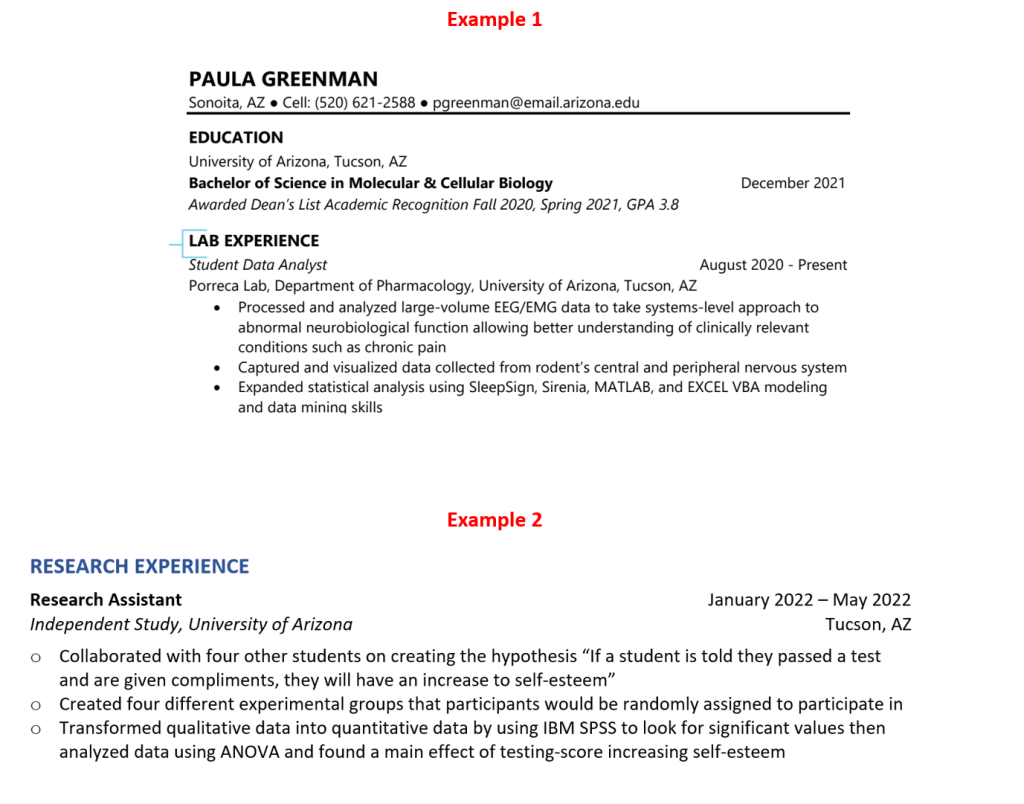
Adding Your Research Skills
Remember, you can also add your research skills to your skills section, if you have one! This is a good place to directly state the skills you used in your research experience. It’s important to state your technical skills, such as programming, equipment, etc. and transferrable skills such as communication, data analysis, etc.
Example Skills Sections
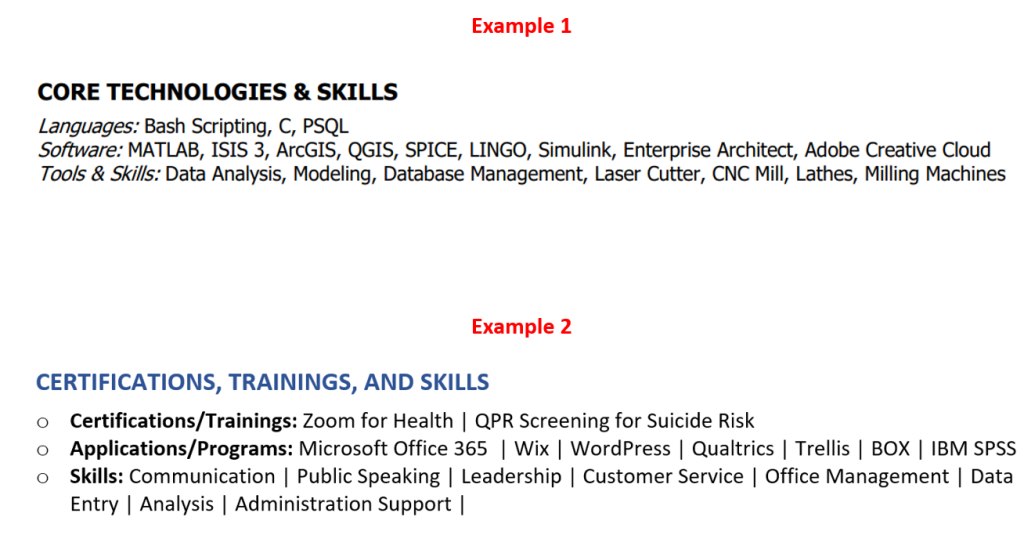
Resume Help
Get more resume information, templates, and more on our website or make an appointment with a Career Peer Coach , who can help you create a new resume or review your current one!
We respectfully acknowledge the University of Arizona is on the land and territories of Indigenous peoples. Today, Arizona is home to 22 federally recognized tribes, with Tucson being home to the O'odham and the Yaqui. Committed to diversity and inclusion, the University strives to build sustainable relationships with sovereign Native Nations and Indigenous communities through education offerings, partnerships, and community service.
Build my resume
- Resume builder
- Build a better resume in minutes
- Resume examples
- 2,000+ examples that work in 2024
- Resume templates
- 184 free templates for all levels
- Cover letters
- Cover letter generator
- It's like magic, we promise
- Cover letter examples
- Free downloads in Word & Docs
3 Undergraduate Research Resume Examples Built for 2024
Undergraduate Research Resume
Clean undergraduate research resume, modern undergraduate research resume.
- Undergraduate Research Resume Writing 101
You’ve completed intensive academic research. It’s built your top-notch ability to analyze data and think critically.
Is your resume prepared as you step into the next phase of your educational or professional career?
We understand that including academic research on a resume can feel confusing. We’ve compiled some effective undergraduate research resume templates and a chatgpt cover letter generator to help you present your best skills and knowledge effectively in 2024.
or download as PDF
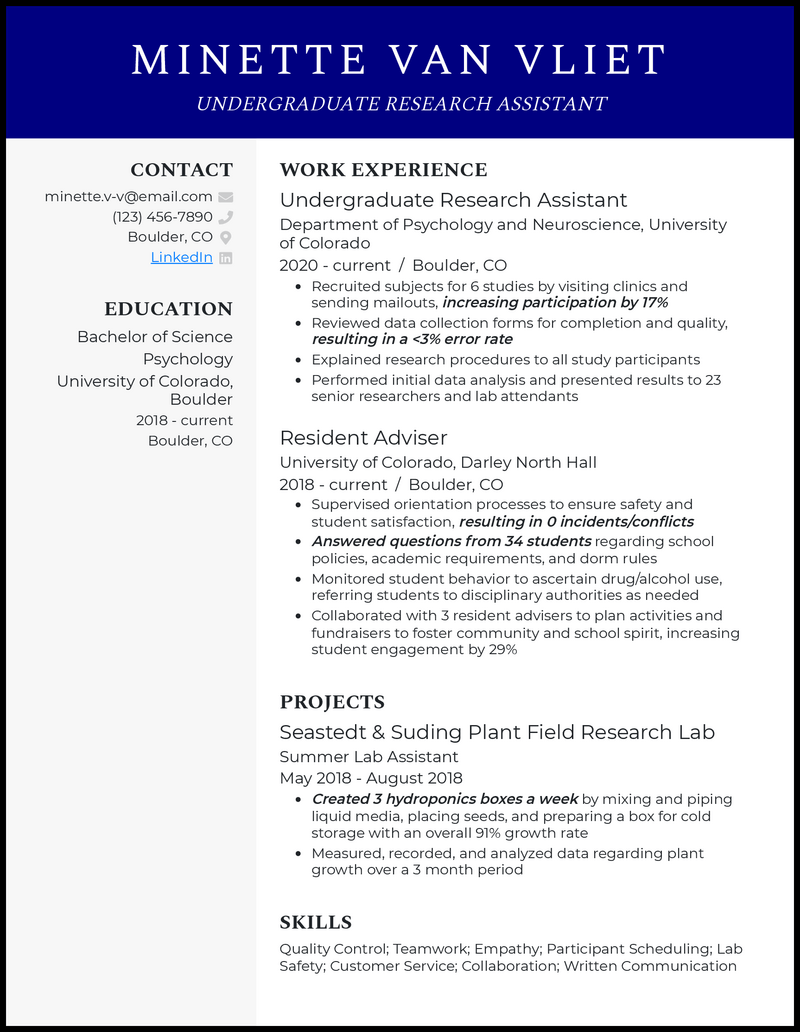
Related resume examples
- Entry-level research assistant
- Laboratory research assistant
- College student
- Grad school
- Research assistant
What Matters Most: Your Undergraduate Research Skills & Work Experience

Undergrad research requires an in-depth process. You’ve poured over tons of data, done many studies, and written detailed papers summarizing your findings. How do you present the skills you’ve built effectively on your resume?
Considering the organization you’re applying to will help. Are you applying for a graduate degree program? Then focusing on academic skills and knowledge will be essential. On the other hand, if you’re applying for a professional research position, the skills you’ll use on the job, like organized information handling, will be more relevant to include.
Here are some of the top skills for undergraduate research resumes.
9 top undergraduate research skills
- Database Management
- Scientific Writing
- Literature Analysis
- Western Blotting
- Molecular Biology
- Microsoft Office
- Statistical Data Analysis
Sample undergraduate research work experience bullet points
By now, you’ll have compelled organizations with your top skills in statistical data analysis and software like IBM SPSS. All you have to do is show how you’ve used those skills in your research experience.
Including as much numerical data as possible to show your impact will be key to a solid resume . That shouldn’t be too difficult since much of your research and reporting process is data-based.
Also, make sure to keep your examples concise. Most organizations will make decisions on resumes quickly, so one sentence about how you use literary analysis to make 80 percent more accurate conclusions is all you have time for.
Here are a few samples:
- Developed 3 new methods to measure fluorescent energy transfer 60% more efficiently.
- Used Microsoft Excel to compile data from 43 cellular uptake experiments to reach 90% more accurate conclusions.
- Helped develop new technology using results from statistical data analysis that solved 45 biomedical problems.
- Conducted a survey that received 5,200 responses and analyzed qualitative data to identify 19 distribution patterns that led to more effective research models.
- Collected 315 tissue culture observations using fixation and immunostaining processes with 98% accuracy
Top 5 Tips for Your Undergraduate Research Resume
- Effective research is about accuracy. Just like you wouldn’t want errors that get your conclusions from research recalled, you don’t want grammar errors taking away from the impact of the top skills on your resume.
- Action words like “measured” and “developed” will present your research skills more authoritatively. For instance, you could include how you measured cell-protein interactions with 98 percent accuracy.
- Your resume should be filled with relevant information about your research experience. Remain specific to the reason you’re applying to achieve this. For example, you could show how your three years of cellular uptake experiments equipped you to succeed in a graduate program’s work requirements.
- Your resume will be packed with data and achievements that must be organized. Use a professional resume template with clear headings for education, research, and top skills like Western blotting and molecular biology. Use bullet points with research experience and an easily readable 12-14 point font.
- Your most recent research experience will likely be the most relevant as you’ve grown your skills in strategic analysis. Additionally, structuring your resume by recency helps decision-makers look back through your experience to see how your experimental processes have progressed.
How to Write an Undergraduate Research Resume
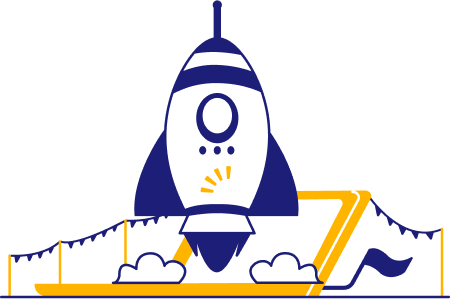
When conducting research, you probably plan the steps to prove or disprove the hypothesis. You should also outline your undergraduate research resume similarly to effectively present how skills like scientific writing or molecular biology have equipped you to succeed.
It’s important to be mindful of why you’re creating an undergraduate research resume. For instance, if you were applying to be a research assistant, you’d want to optimize for each laboratory’s specific needs. Some may want you to help with statistical data analysis, while others may need help creating Tableau dashboards.
You know that research is all about the numbers. Therefore, whenever you can show how you helped achieve more accurate findings or establish research models more efficiently, you should emphasize that on your undergrad research resume. It’ll make each example you list more impactful.
A hobbies/interests section can help if you’re struggling to fill up a full page on your undergrad research resume. For instance, listing how you participated in your school’s biology or chemistry club could show more relevant details about your scientific knowledge and why you’re interested in a research-based field.
Use your cover letter to fill in additional information you couldn’t fit on your resume. For instance, you can explain more about your analytical decision-making processes or what makes you passionate about your research topic.
Your education will be crucial if you’re applying to an academic or technical organization, so you should include it. Plus, a bachelor’s degree in topics like biology will help present the well-rounded knowledge that makes you an effective analytical professional.
An objective can be useful for those entering an academic field. A short summary of how you’re a dedicated research professional with three years of experience conducting 52 experiments in molecular cell interactions can help round out your top skills.

Resume Worded | Resume Skills
Skill profile, improve your resume's success rate by using these research skills and keywords ..
- Hard Skills and Keywords for your Research Resume
- ATS Scan : Compare Your Resume To These Skills
- Sample Resume Templates
- How To Add Skills to Your Research resume
Research Resume Templates
- Word Cloud for Research Skills & Keywords
Browse Jobs in this Category
Frequently asked questions.
- 3. Effective Action Verbs for your Resume
Get a Free Resume Review
Looking for keywords for a specific job search for your job title here., © 2024 resume worded. all rights reserved., research resume keywords and skills (hard skills).
Here are the keywords and skills that appear most frequently on recent Research job postings. In other words, these are the most sought after skills by recruiters and hiring managers. So try to include them on your resume where possible. Go to the Sample Templates ↓ below to see how to include them on your resume. Remember that every job is different. Instead of including all these keywords on your resume, identify the keywords most relevant to the job you're applying to and include those. Use the free Targeted Resume tool to help with this.
- Python (Programming Language)
- R (Programming Language)
- Machine Learning
- Find out what your resume's missing
- C (Programming Language)
- Data Analysis
- Microsoft Access
- Deep Learning
- Computer Vision
- Programming
- Geographic Information Systems (GIS)
- Project Management
- Quantum GIS
- Cartography
- Market Research
- ArcGIS Products
- Project Planning
- Engineering
- Sustainable Development
- Public Speaking
- Research and Development (R&D)
- Product Development
- Manufacturing
- Laboratory Skills
- Design of Experiments (DOE)
- Materials Science
- Computer-Aided Design (CAD)
- Accreditation
- Simulations
- Signal Processing
- Artificial Intelligence (AI)
- Mechanical Engineering
- Electronics
- Finite Element Analysis (FEA)
- Embedded Systems
- Software Development
- Qualitative Research
- Quantitative Research
- Survey Design
- Life Sciences
- Research Design
- Clinical Research
- Clinical Trials
- Biotechnology
- Focus Groups
- Grant Writing
- Policy Analysis
- Questionnaire Design
- Customer Insight
- Molecular Biology
- Survey Research
- Consumer Behavior
- Advertising Research
- Segmentation
- Primary Research
- Online Research
- Report Writing
- Consumer Insight
- Cross-functional Team Leadership
- Continuous Improvement
- Product Management
- Team Leadership
- Strategic Planning
- Good Clinical Practice (GCP)
- Clinical Monitoring
- Clinical Trial Management System (CTMS)
- Electronic Data Capture (EDC)
- Clinical Development
- CRO Management
- Clinical Research Associates
- Clinical Data Management
- Standard Operating Procedure (SOP)
- Therapeutic Areas
- Clinical Operations
- Oncology Clinical Research
- Regulatory Submissions
- U.S. Food and Drug Administration (FDA)
- Clinical Site Monitoring
- Product Innovation
- Software Project Management
- Innovation Management
- Integration
- Business Strategy
- Agile Methodologies
- Software as a Service (SaaS)
- Cell Culture
- Biochemistry
- Cell Biology
- Western Blotting
- Spectroscopy
- Polymerase Chain Reaction (PCR)
- Nanotechnology
- Bioinformatics
- Market Analysis
- Secondary Research
- Marketing Strategy
- Competitive Analysis
- Market Intelligence
- Digital Marketing
- Business Development
- Lead Generation
- Program Evaluation
- Qualitative & Quantitative Research Methodologies
- Community Outreach
- Data Collection
- Public Policy
- Higher Education
- Project Coordination
- Communication
- Event Management
- Commercialization
- Product Launch
- Design Control
- Medical Devices
- Drug Discovery
- Quality System
- Technology Transfer
- Biomedical Engineering
Resume Skills: Data Analysis & Visualization
- Python (numpy, pandas)
- Match your resume to these skills
Resume Skills: Machine Learning
- Scikit-Learn
Resume Skills: Big Data
- AWS Redshift
Resume Skills: Programming & Web
Where on my resume do I add these buzzwords? Add keywords directly into your resume's work experiences , education or projects. Alternatively, you can also include a Skills section where you can list your technical skills in order of your proficiency. Only include these technical skills or keywords into your resume if you actually have experience with them.
Does your resume contain all the right skills? Paste in your resume in the AI Resume Scan ↓ section below and get an instant score.
Compare Your Resume To These Research Skills (ATS Scan)
Paste your resume below and our AI will identify which keywords are missing from your resume from the list above (and what you need to include). Including the right keywords will help you get past Applicant Tracking Systems (i.e. resume screeners) which may scan your resume for keywords to see if you're a match for the job.
Sample Research Resume: How To Include These Skills
Add keywords directly into your resume's work experiences , education or skills section , like we've shown in the examples below. use the examples below as inspiration..
Where on my resume do I add these buzzwords? Add keywords directly into your resume's work experiences , education or projects. Only include these technical skills or keywords into your resume if you actually have experience with them.
How do I add skills to a Research resume?
Go through the Research posting you're applying to, and identify hard skills the company is looking for. For example, skills like C (Programming Language), C++ and LaTeX are possible skills. These are skills you should try to include on your resume.
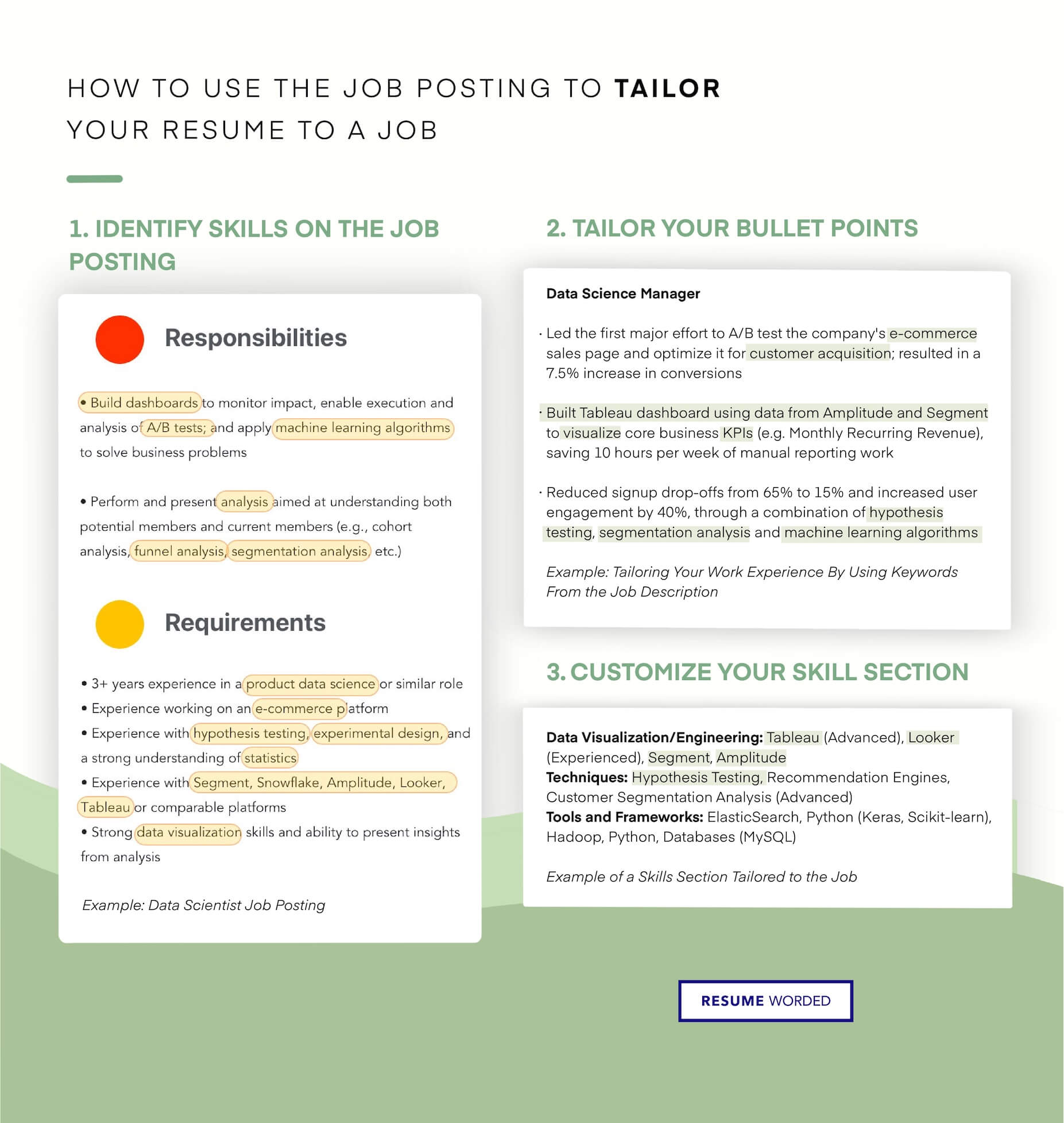
Add other common skills from your industry - such as Research, Python (Programming Language) and Machine Learning - into your resume if they're relevant.

Incorporate skills - like Consumer Behavior, Agile Methodologies and Regulatory Submissions - into your work experience too. This shows hiring managers that you have practical experience with these tools, techniques and skills.
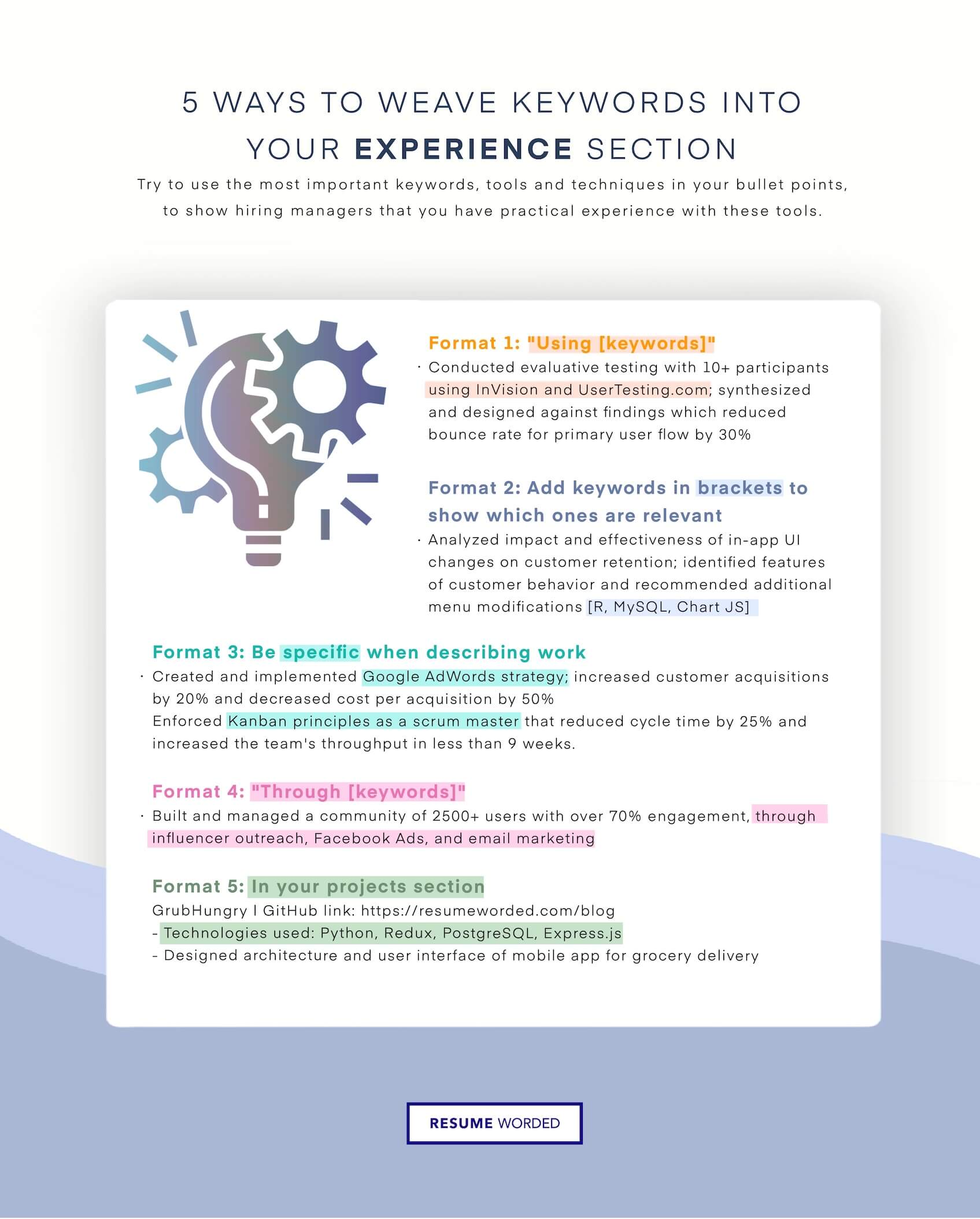
Consider including a section in your resume dedicated to your research experience. On Research resumes, hiring managers want to see research projects which you led or where involved with, and their outcomes.
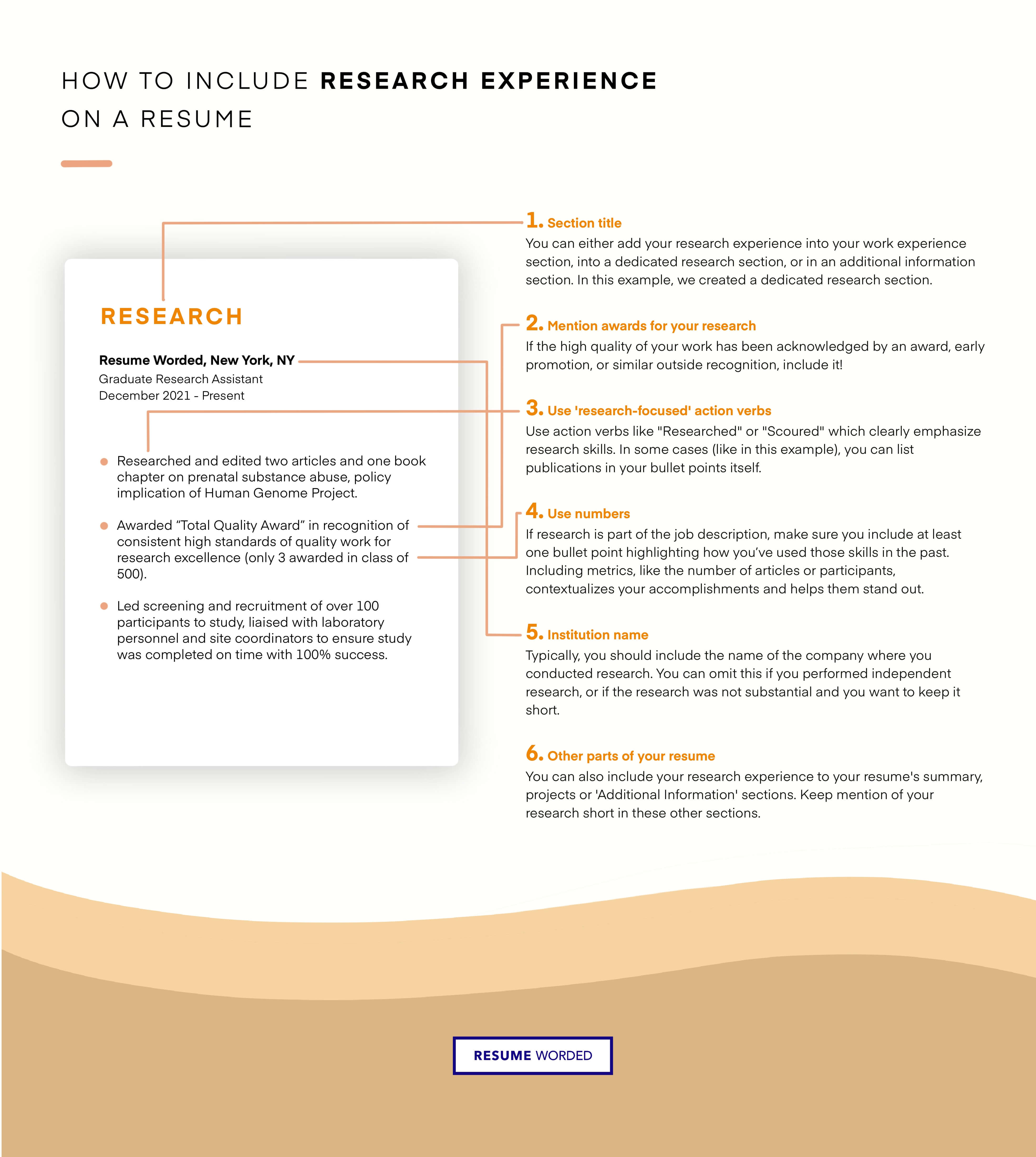
Try to add the exact job title, Research, somewhere into your resume to get past resume screeners. See the infographic for how to do this.
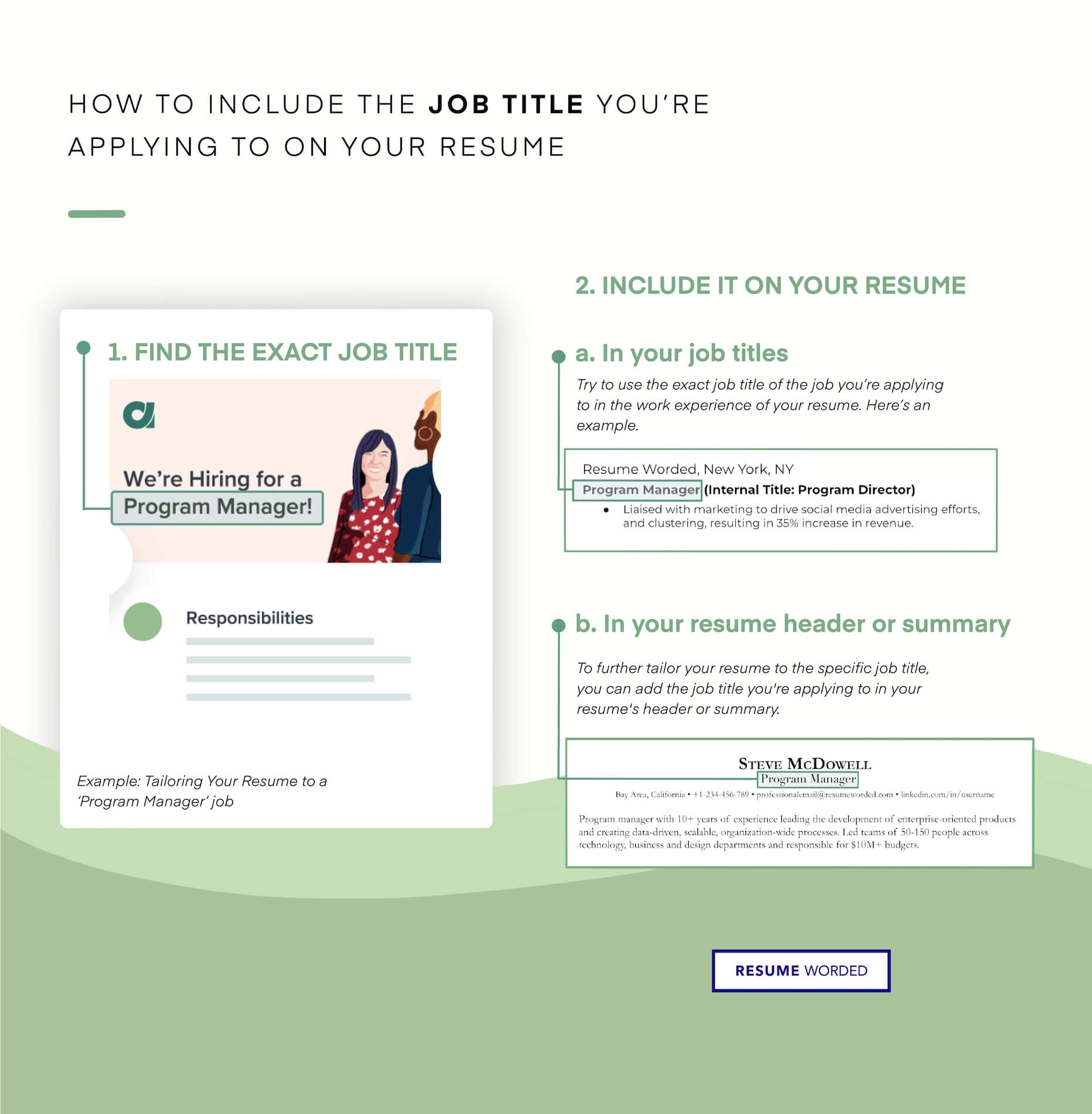
Here are examples of proven resumes in related jobs and industries, approved by experienced hiring managers. Use them as inspiration when you're writing your own resume. You can even download and edit the resume template in Google Docs.
Resume Example Clinical Research Assistant
An effective Description of the templates...
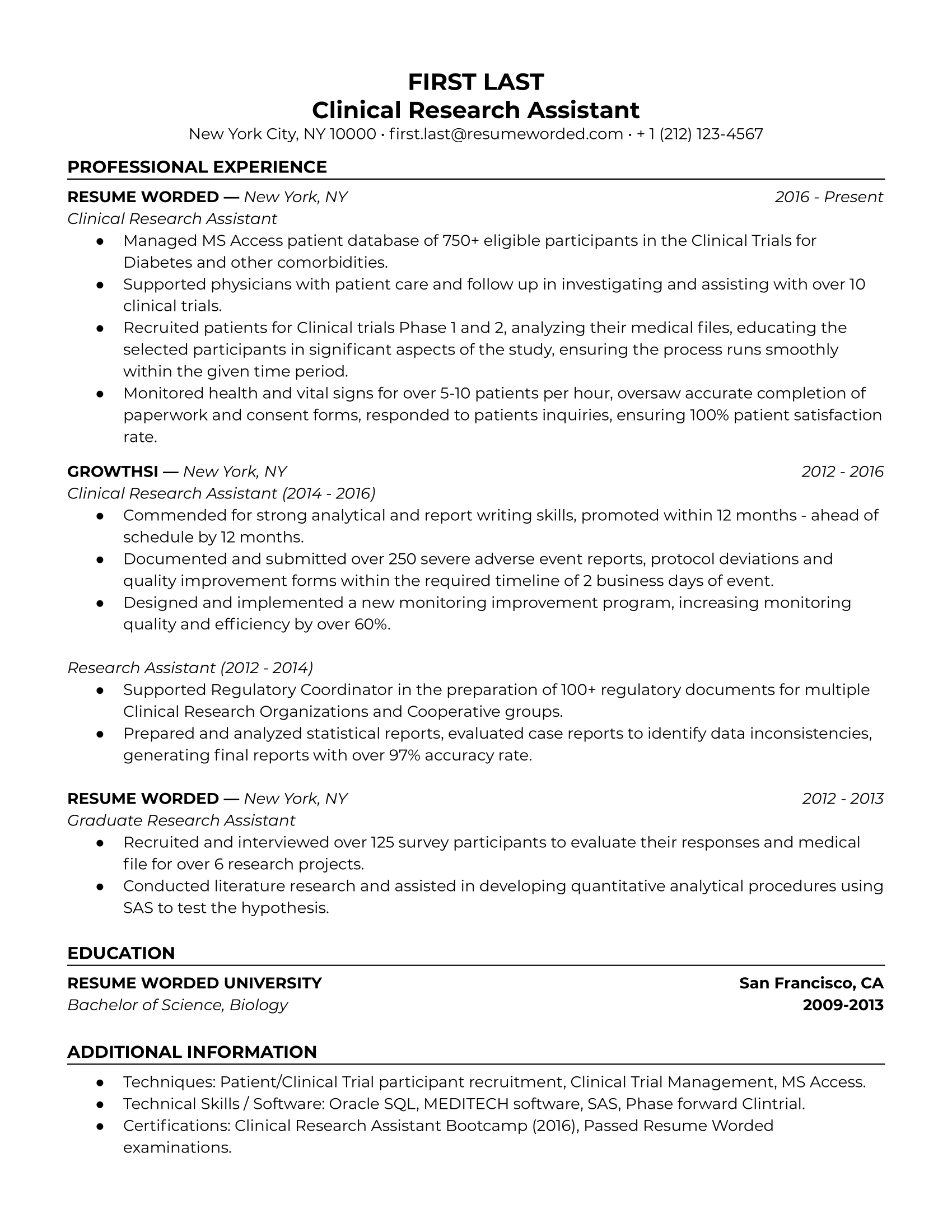
Download this resume template
Clinical research assistants work on clinical trials in hospitals and medical research centers. As a clinical research assistant, you’ll be assisting doctors and senior researchers by recruiting and enrolling research subjects, developing protocols, setting up and managing trials, collecting and analyzing data, and contributing to trial reports, regulatory authority applications, and grant writing. Ideally, you’ll need some experience or a degree in the field of study and clinical trial experience.
Tips on why this template works
focused on clinical research.
When applying for a more specialized position like clinical research assistant, you want to keep your resume as tightly focused as possible. That means prioritizing clinical research experience. It’s fine to include general research experience, but try to tailor your bullet points by including accomplishments relevant to clinical research, like preparing regulatory documents and conducting medical research.
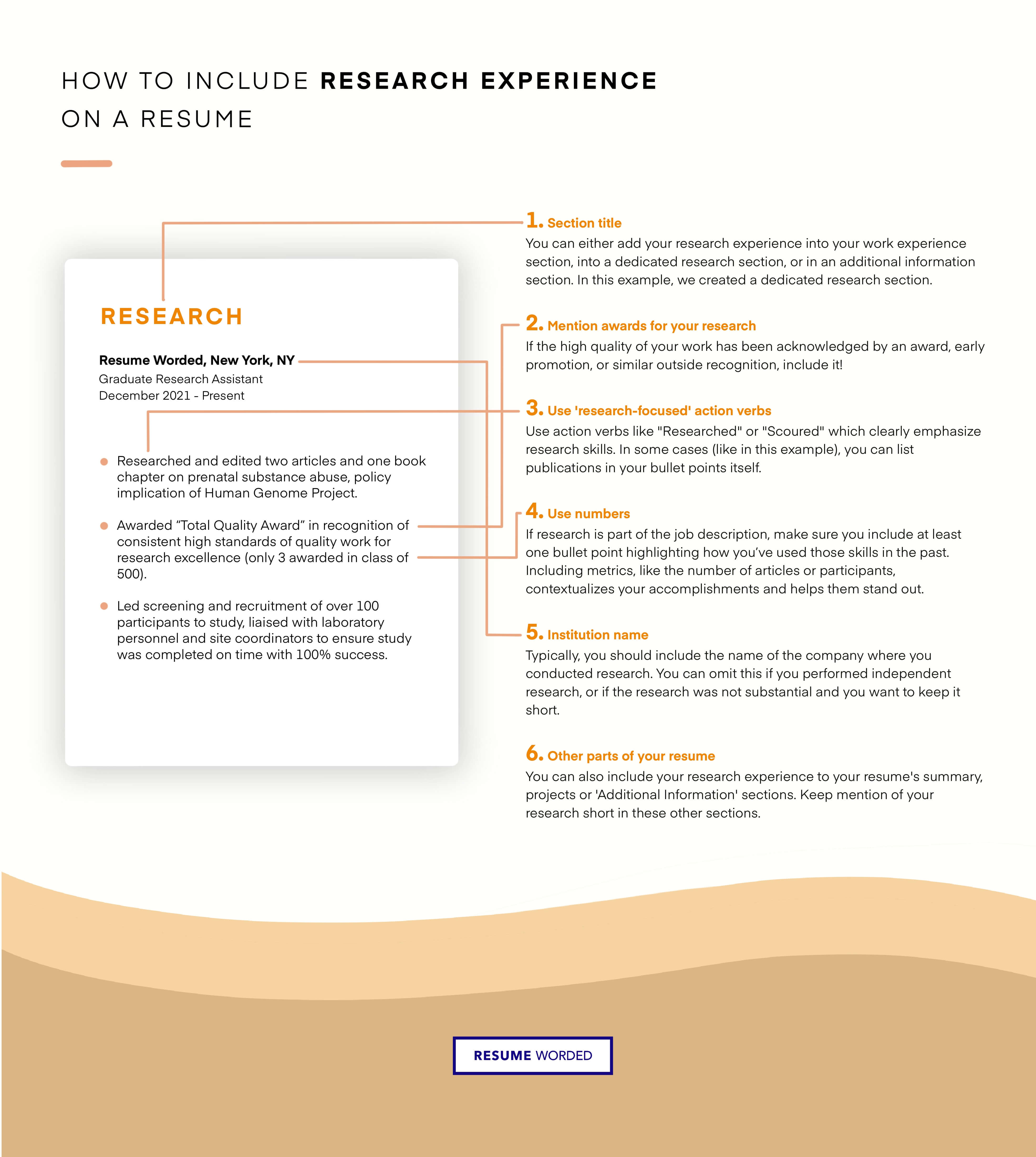
Good use of skills section to highlight research skills and tools
Jobs that require a lot of hard skills, like clinical research, may end up with a larger than usual skills section. Avoid making recruiters’ eyes glaze over by splitting it into subsections, like certifications, techniques, and technical skills. Make sure you’re exclusively listing hard skills — employers want to see things like relevant software skills and clinical trial experience.


Resume Example Laboratory Research Assistant
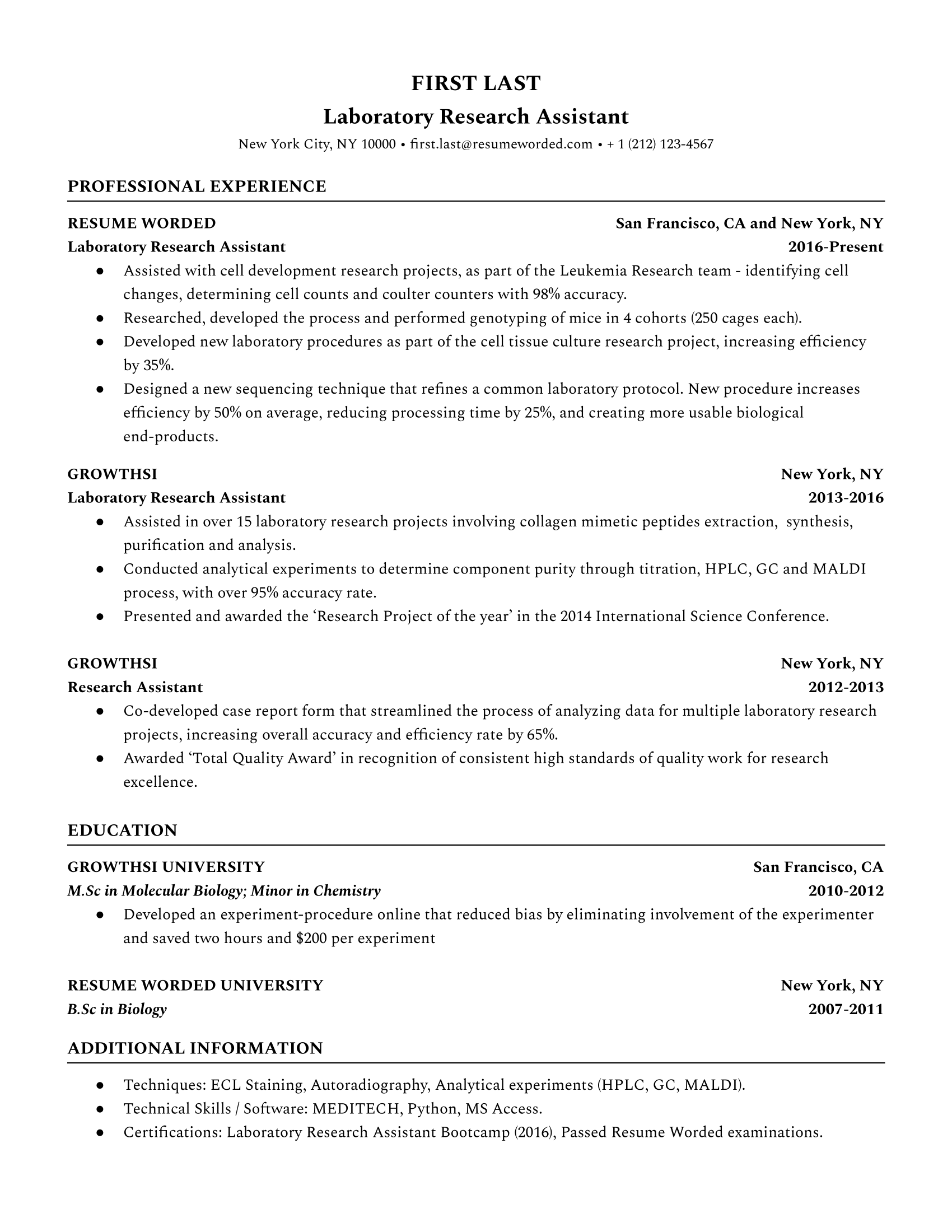
As a laboratory research assistant, you’ll be working in a laboratory environment to design projects, conduct research and experiments, write reports, perform general laboratory maintenance, and assist senior laboratory staff — so make sure to emphasize your technical skills. You may be working for a private laboratory, medical or research facility, or pharmaceutical company. Unlike standard research assistant positions, lab assistants typically work full-time, including weekend and evening shifts.
Bullet points feature strong action verbs
Every bullet point should start with a strong action verb. Remember, your resume is supposed to highlight your accomplishments, not simply list your job duties. As a laboratory research assistant, you’ll want to emphasize your scientific expertise. Verbs like Researched, Designed, and Developed all reflect the skills you’ll be expected to use on the job.
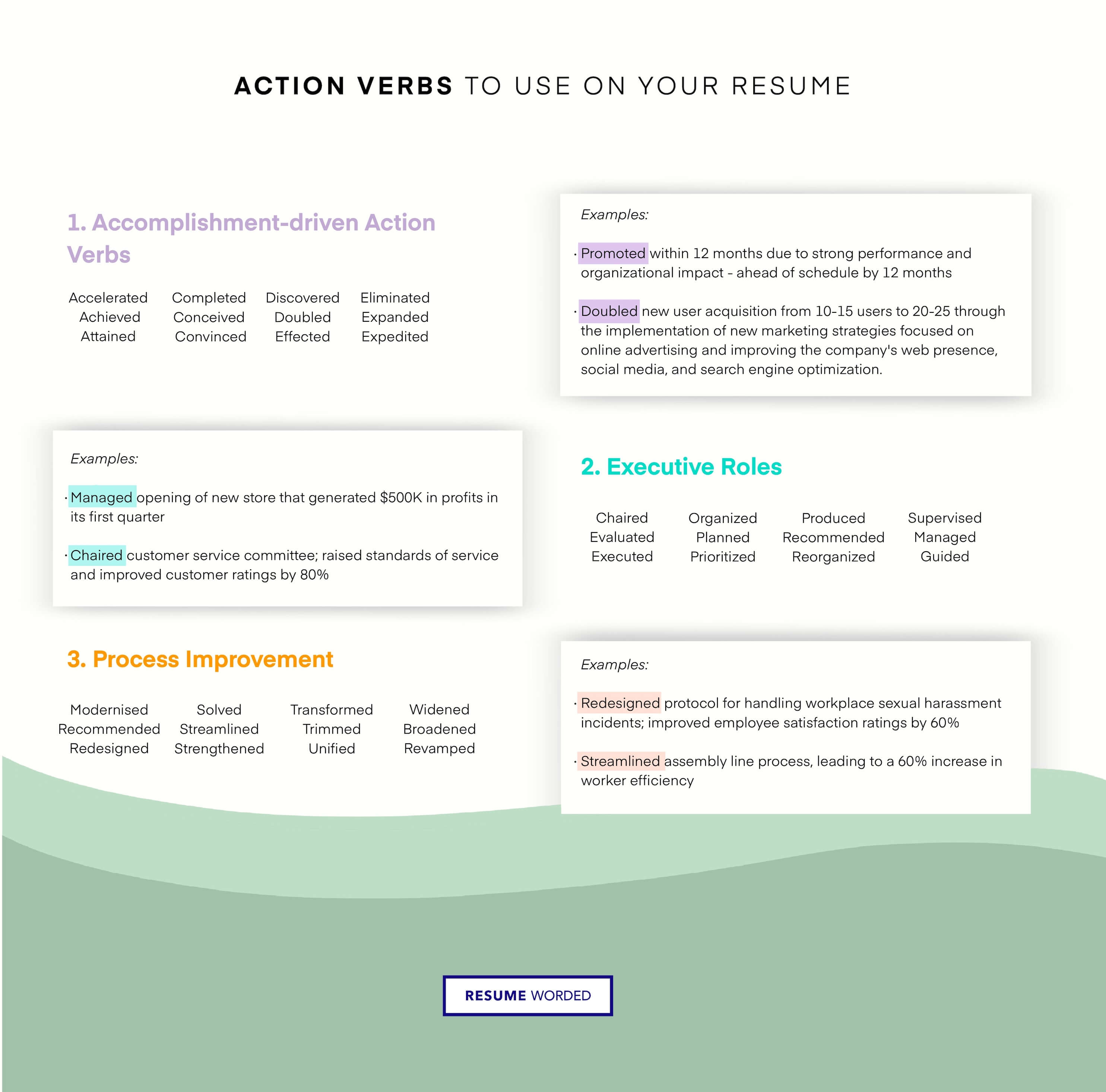
Uses hard numbers and metrics
Including metrics in your bullet points is the best way to demonstrate the outcome of your work. This doesn’t mean every bullet point needs to include numbers but try to quantify your accomplishments whenever possible. If you analyzed data with 98% accuracy, reduced processing times by 25%, or performed research on 1,000 subjects, say exactly that.
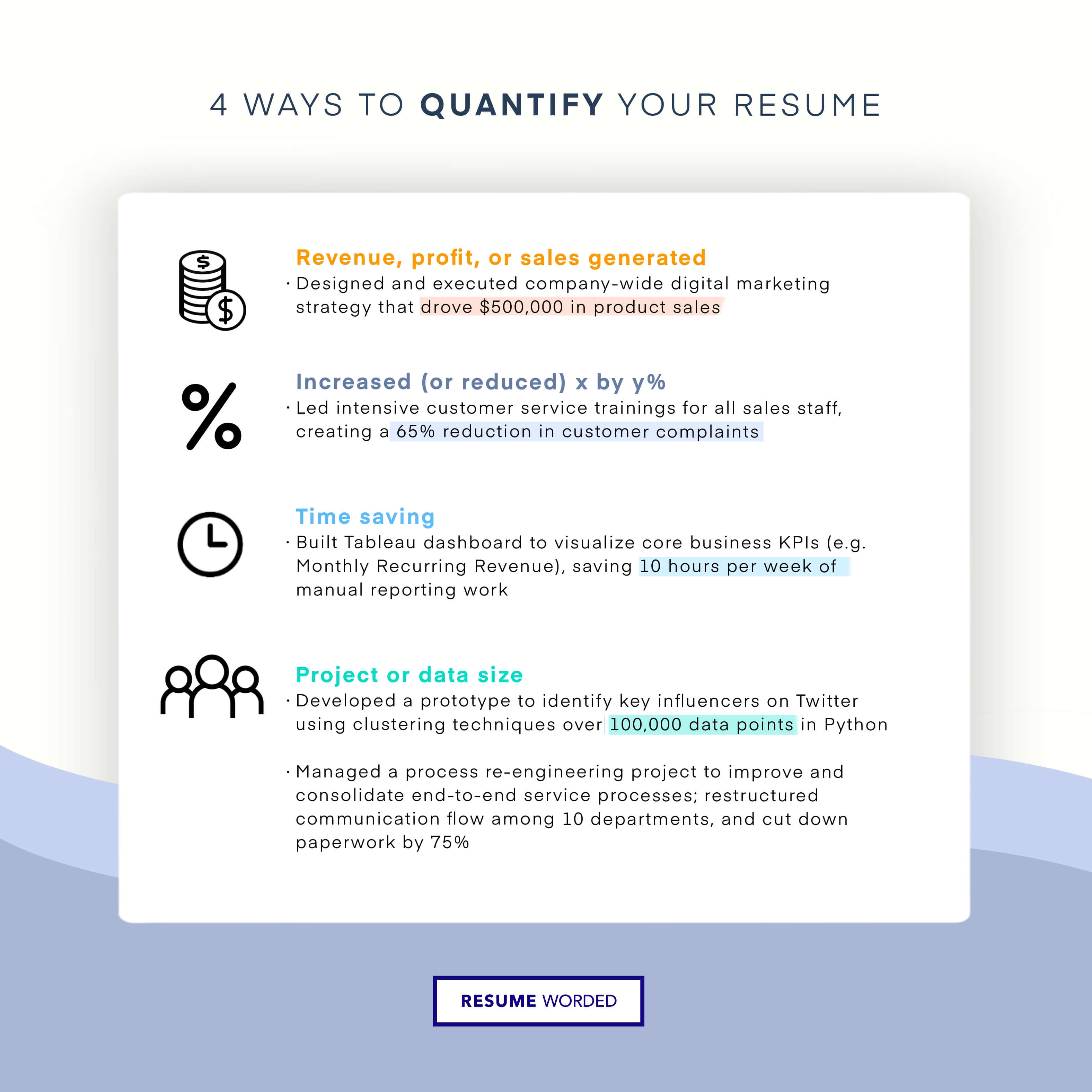
Resume Example Graduate Research Assistant
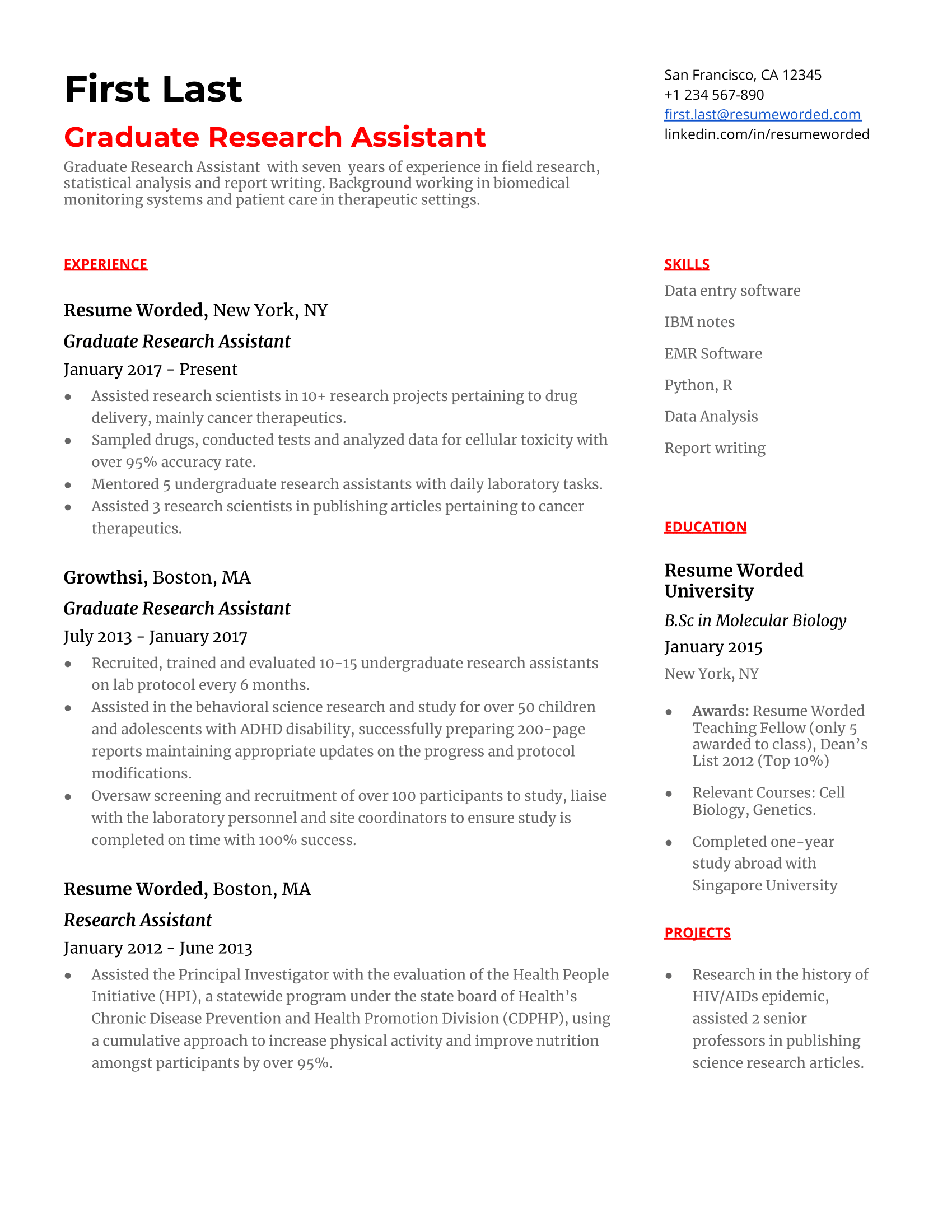
Graduate research assistants are able to work while they study, receiving a tuition reimbursement or stipend as well as valuable experience working in academia. As a graduate research assistant, you’ll have completed an undergraduate degree and be pursuing a master’s degree or PhD. You’ll generally be working closely with a supervisor to support their projects, including conducting research, analyzing data, writing reports, and supervising undergraduate research assistants.
Highlights university research projects
As a graduate research assistant, hiring managers won’t expect you to have extensive paid experience. If you’ve worked on previous research projects as a student, you can list these under your work experience or in an education or projects section. For greater impact, use action verbs and metrics to frame your accomplishments in an action-focused way.
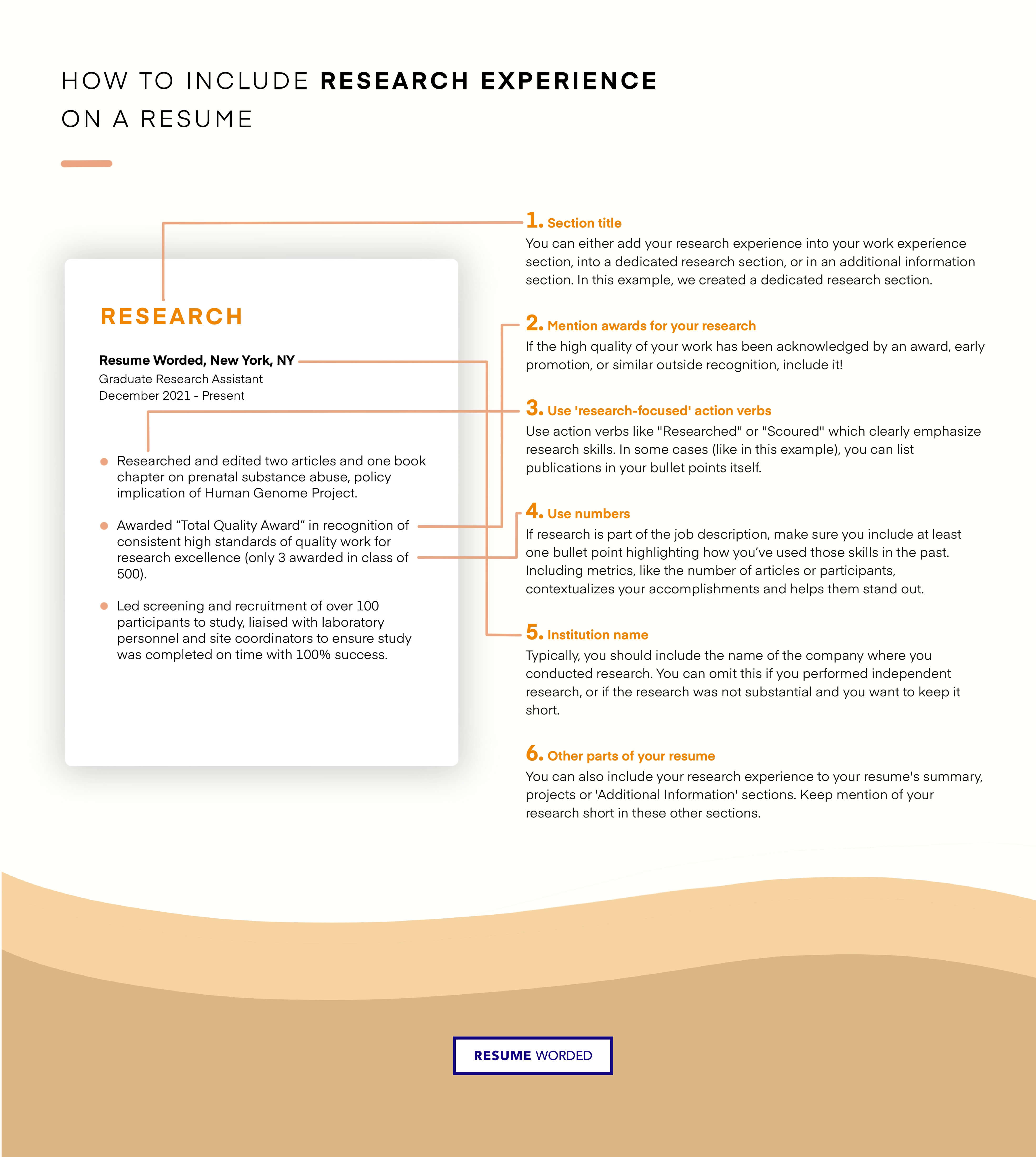
Includes a resume summary focused on graduate research interests and experience
Even as a graduate, you may have significant research experience, especially if you’ve been heavily involved in student research. You can highlight your skills and background with a short resume summary — no more than 100 words — explaining your years of experience, research or educational specialization, and 1-2 of your most impressive accomplishments.

Resume Example Chemistry Research Student
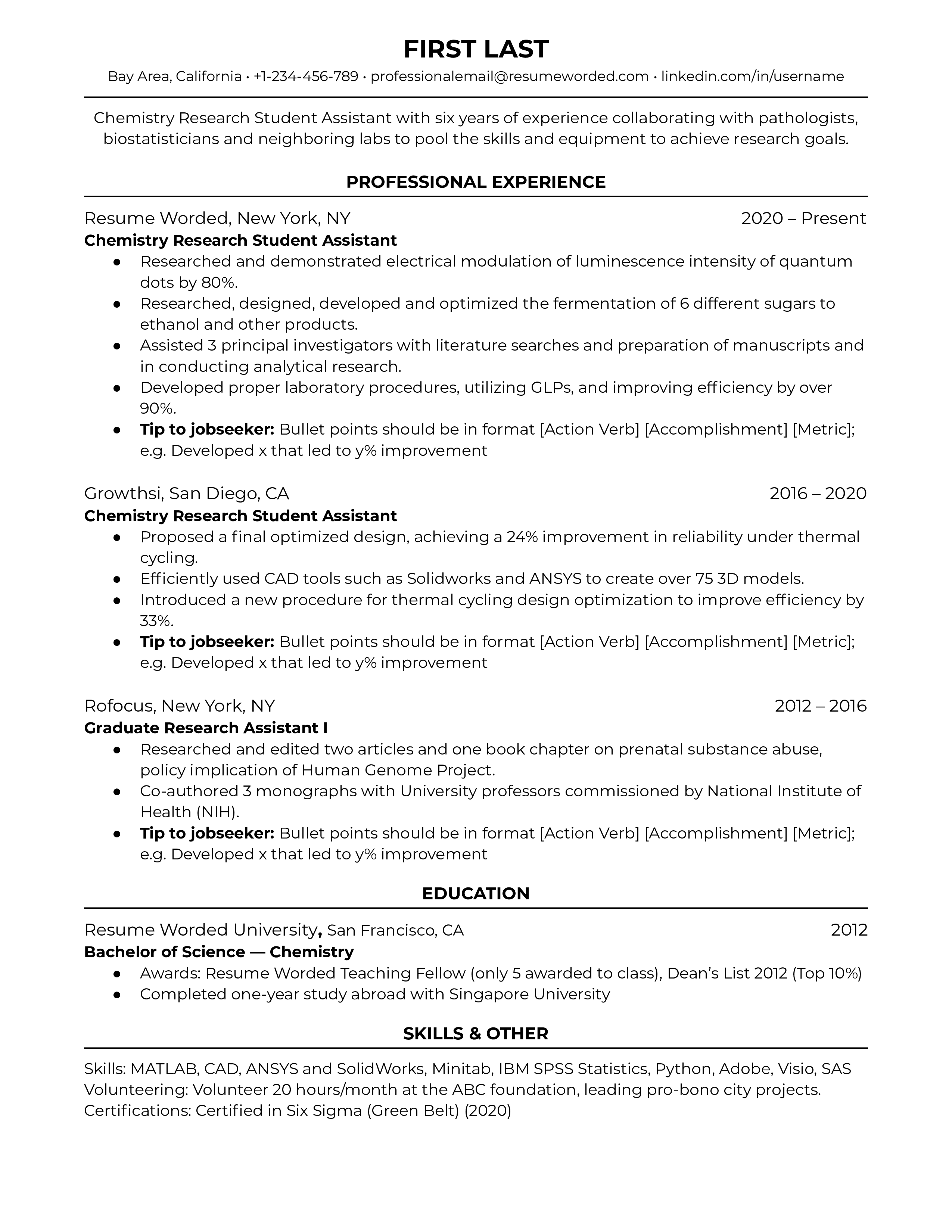
When applying to be a chemistry research student assistant, emphasize your past research experience and chemistry skills in your resume. Chemistry is a specific and precise discipline, and your resume should reflect these qualities. Aim to choose instances that detail your expertise in hands-on lab procedures or with relevant software, as opposed to simply listing out the responsibilities you were assigned. Use strong action verbs and be deliberate with what you include.
Emphasize hard skills with metrics relevant to chemistry
As mentioned above, chemistry is a precise discipline -- you’re often working in the lab with dangerous chemicals or complex equipment. That means that the employers reading your resume -- labs, government agencies, or academic institutions -- are looking for evidence of your experience and skills in those areas. Do your research to find what types of software the job posting notes, whether that’s MATLAB, Solidworks, or ANSYS. Emphasize the hard skills you’ve learned through your past experience with powerful action verbs, and highlight your achievements with quantifiable metrics.
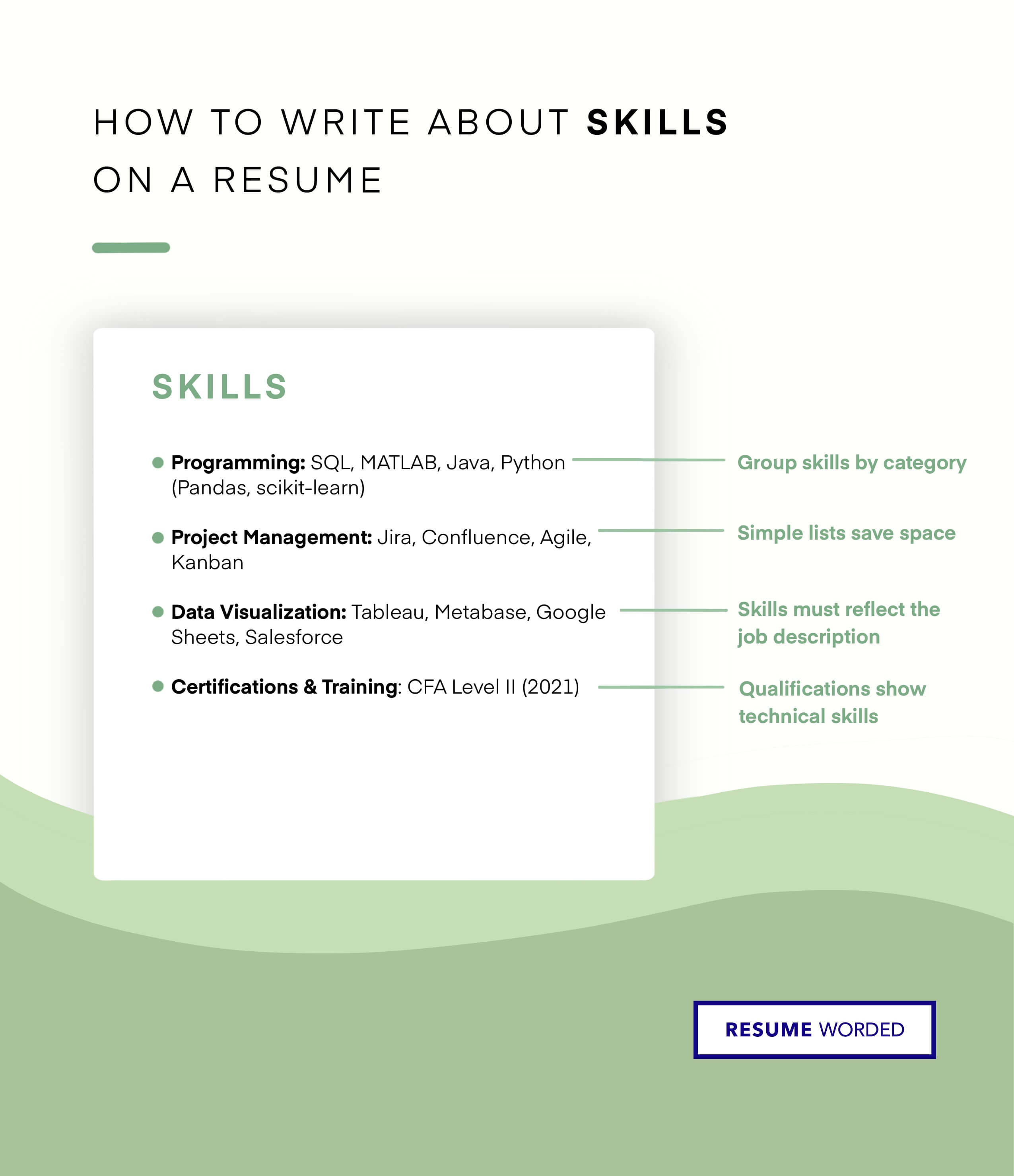
Concise, informational chemistry resume summary
This resume makes great use of a concise, information-packed elevator pitch that is well-written and to the point. Chemistry recruiting managers often don’t have time to carefully read through every detail of your resume, so a resume summary is a great way for them to get a high-level overview of your work history. When brainstorming what to put in your chemistry resume elevator pitch, include your personal strengths as a chemist, or even the types of people you’ve learned to work with (i.e., biostatisticians, pathologists, professors).
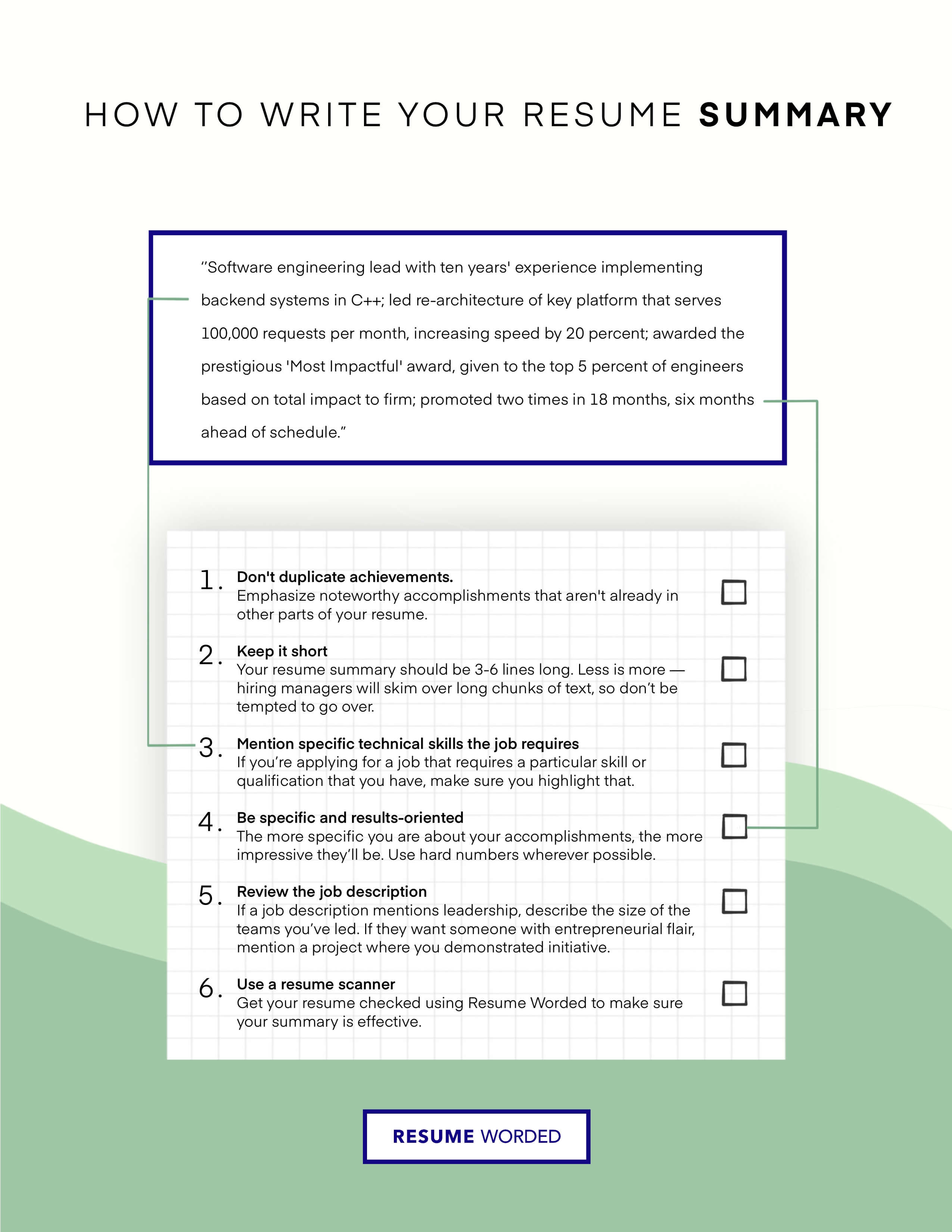
Resume Example Policy and Research Policy Analyst
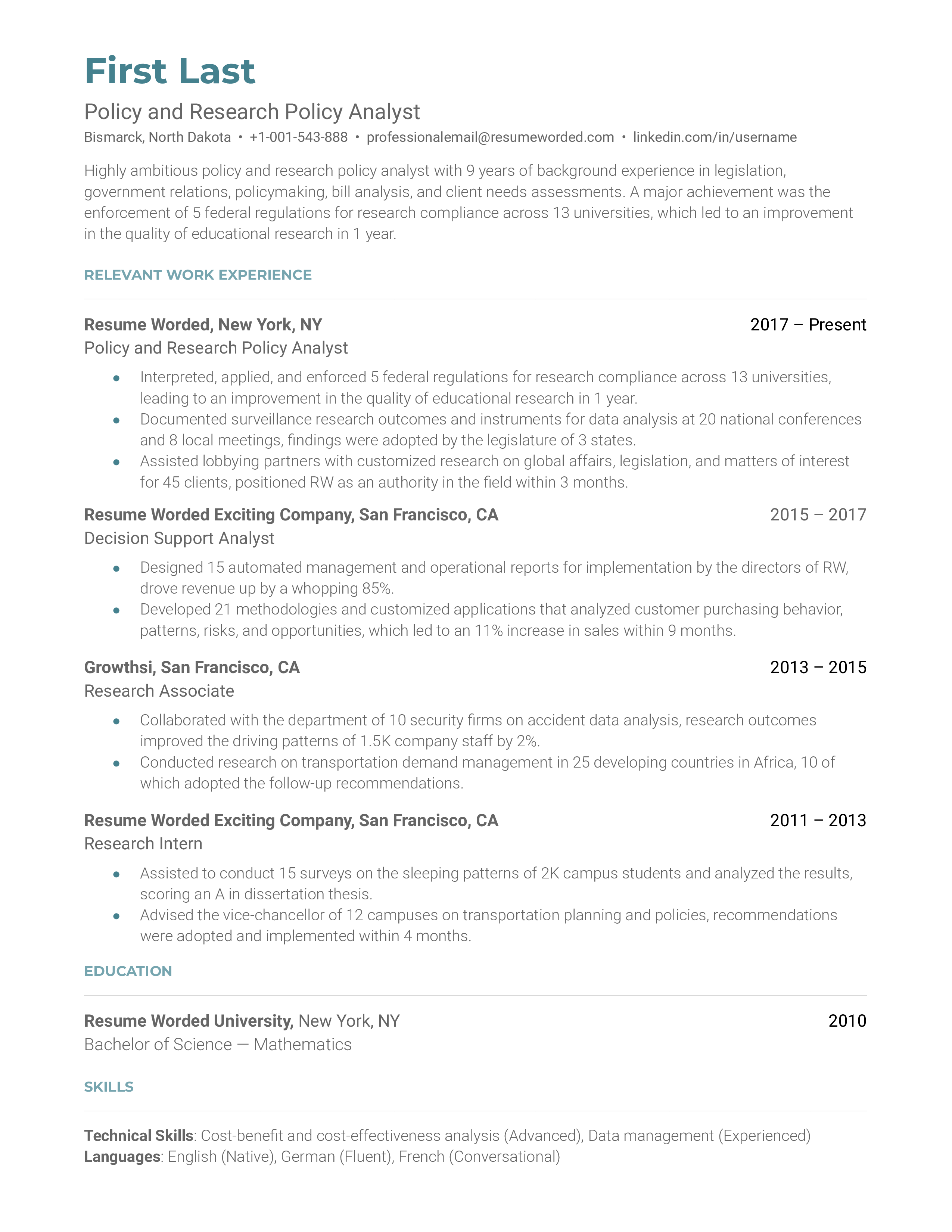
As the title suggests, this position requires an analyst to interrogate current policies or problems, do in-depth research and data analysis around a problem and be able to offer workable solutions. You will most likely work under a senior analyst and possibly as part of a team of analysts. You should therefore be an effective team player. This resume does a great job of highlighting the applicant's extensive research-based background as well as their ability to develop effective solutions. It also does a great job of emphasizing the applicant’s ability to successfully collaborate with colleagues.
Highlight research experience.
You want an employer to be confident in your capabilities to properly research any assigned topic. You also want to make it clear that not only do you have extensive experience as a researcher but you are also capable of synthesizing the research into solutions. So, highlight your crafted solutions - especially those that were adopted.
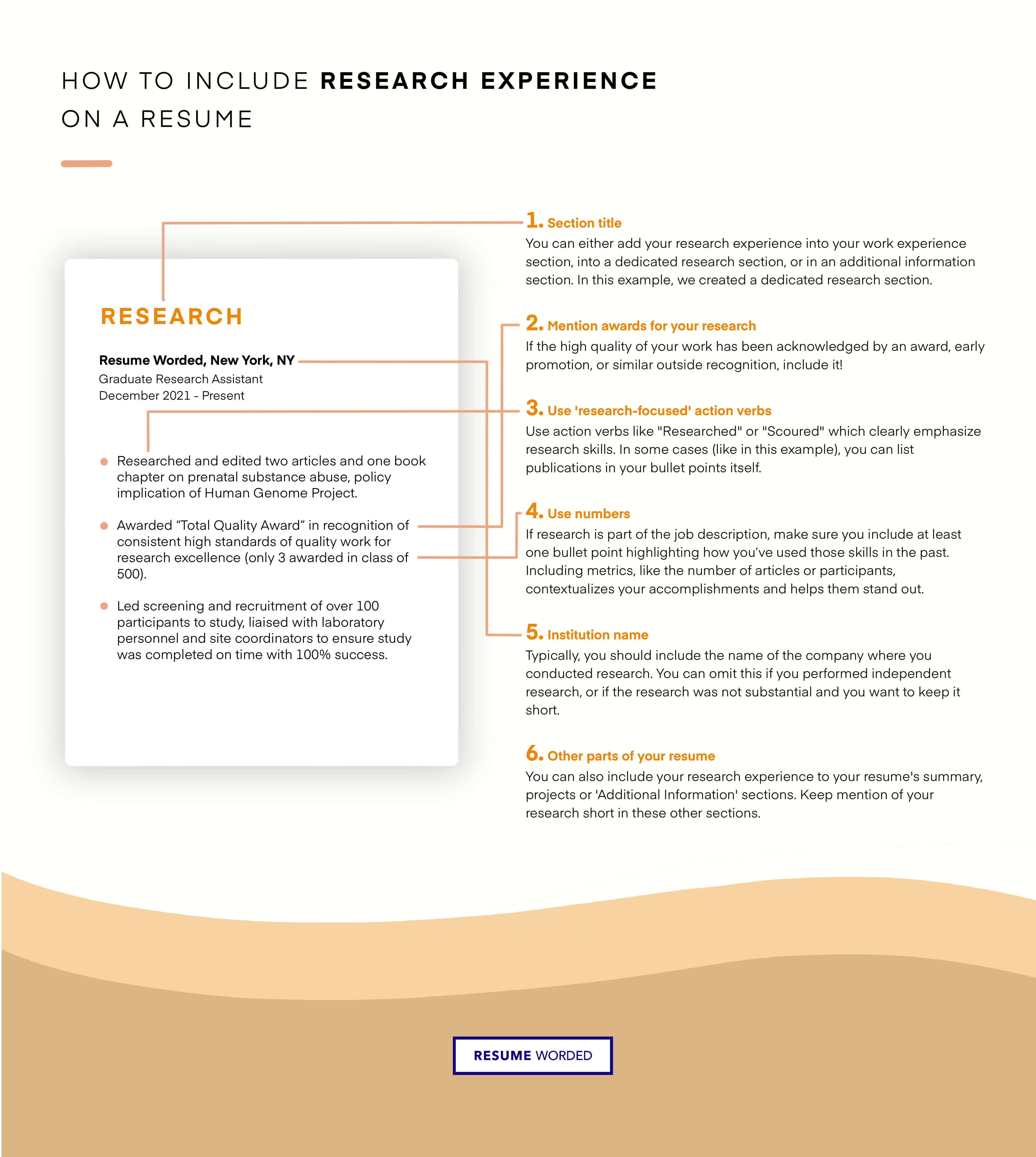
Quantify your value add to employers.
A policy analyst is supposed to create workable solutions that should have positive results. Show your effectiveness by quantifying how your suggestions and policy saved resources, increased revenue, or otherwise benefitted your previous employers.
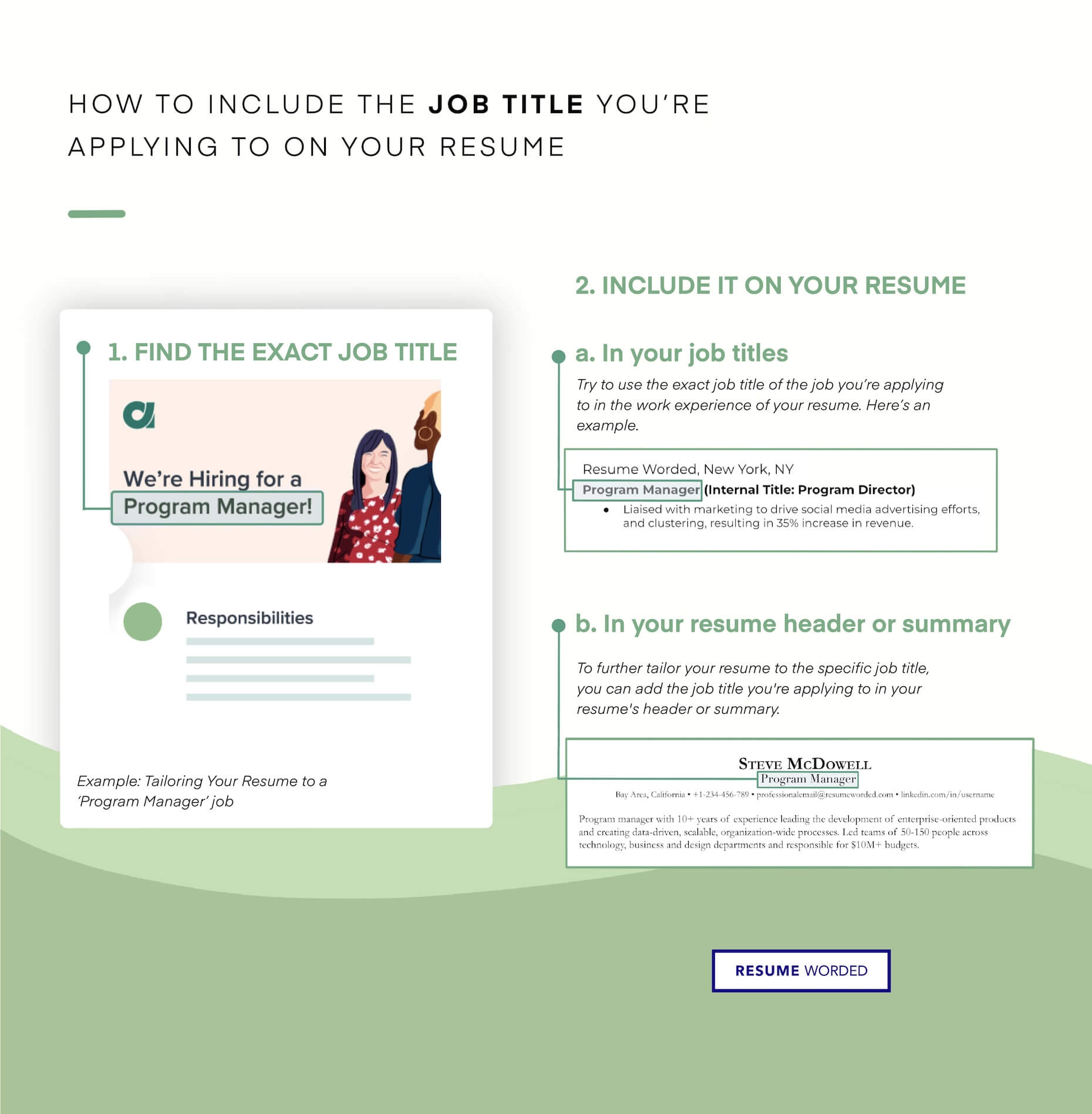
Resume Example Equity Research Associate
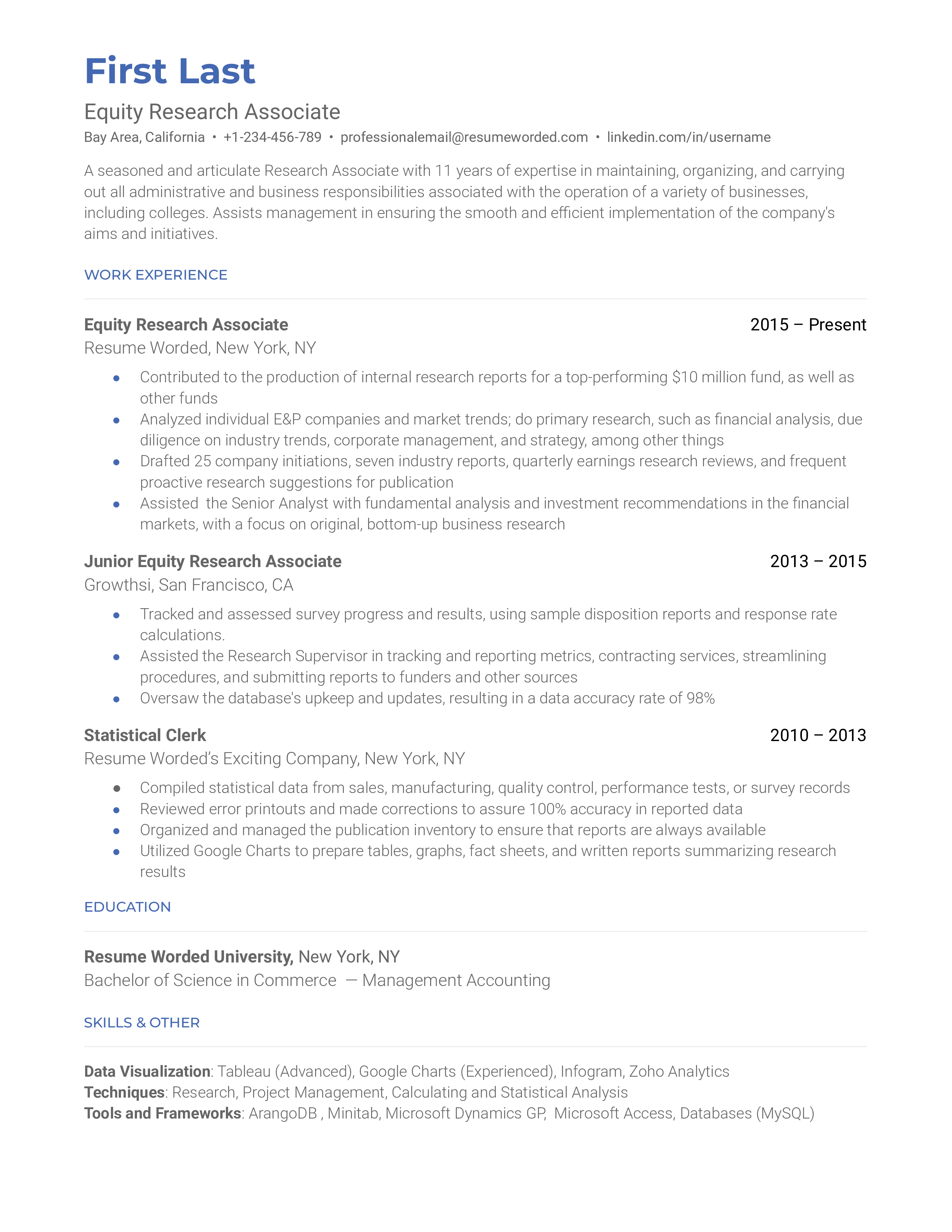
An equity research associate position is commonly an entry-level position in the equity research analyst industry. In this position, you will generally be working under/with a more senior research associate. You will be doing a lot of financial modeling, valuation, and other necessary financial research. Your work will help inform the recommendations the senior analyst will make to the decision-makers. This position has a heavy and varied workload. You will want your resume to show your ability to complete varied research and analysis-related tasks to a high level. If you do not have years of experience, you will also want to clearly list any related educational background and any skills that would enable you to complete expected tasks.
Include research and analysis experience in related industries.
Because this can be an entry related position, you may not always have a lot of equity research experience. So include any positions you have had in related industries. Especially if those positions are research and analysis related.
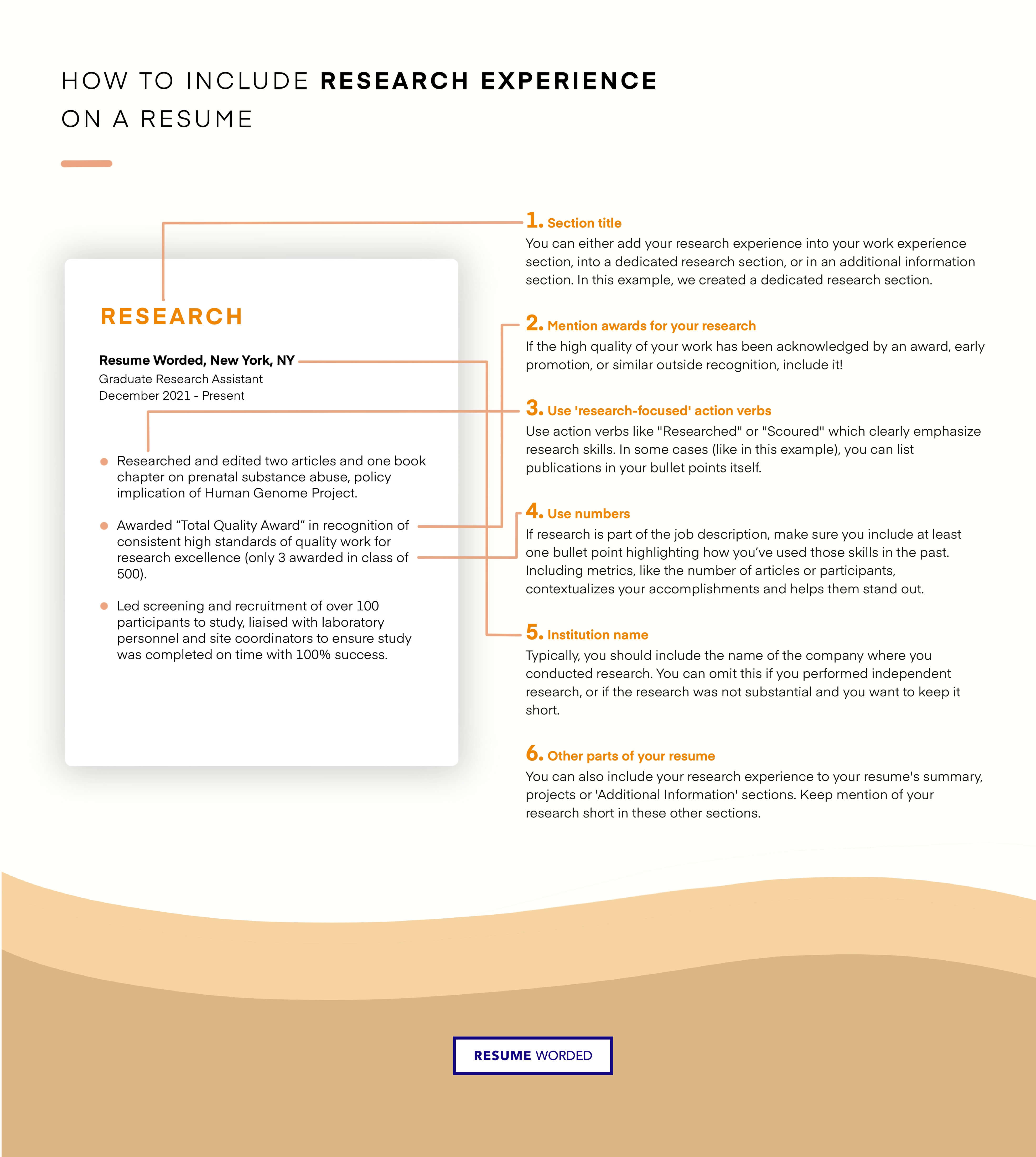
Highlight research and analysis skills and tools.
What you can’t prove in experience, you can prove with your skills list. Ensure you write a comprehensive list of all your learned skills that would be useful in your position. Remember that you can always take courses online to learn new skills to bolster your resume.

Word Cloud for Research Skills & Keywords
The following word cloud highlights the most popular keywords that appear on Research job descriptions. The bigger the word, the more frequently it shows up on employer's job postings. If you have experience with these keywords, include them on your resume.

Get your Resume Instantly Checked, For Free
Upload your resume and we'll spot the issues in it before an actual research recruiter sees it. for free., what are the top skills you should add to your research resume.
The most common skills and keywords we found on Research resumes and job postings were MATLAB, Python (Programming Language), C++, LaTeX, R (Programming Language), Research, Machine Learning and C (Programming Language). Skills like Consumer Behavior, Marketing, Agile Methodologies, Regulatory Submissions and Design Control also appeared on related job postings.
How do resume skills compare between a Research Consultant and a Research Coordinator?
Popular skills we often see on resumes for Research Consultant positions include:
In comparison, skills we see on Research Coordinator resumes include:
What are good resume skills to include for different Research roles and job titles?
Depending on the specific role you apply to, you may need to emphasize different skill sets. Here are a few examples:
- Research Coordinator : Research, Clinical Trials, Clinical Research, Data Analysis and Qualitative Research
- Research Consultant : Quantitative Research, Statistics, IBM SPSS, Program Evaluation and R (Programming Language)
- Vice President Research And Development : Research and Development (R&D), Product Development, Commercialization, Cross-functional Team Leadership and U.S. Food and Drug Administration (FDA)
Target your Resume to a Job Description
While the keywords above are a good indication of what skills you need on your resume, you should try to find additional keywords that are specific to the job. To do this, use the free Targeted Resume tool. It analyzes the job you are applying to and finds the most important keywords you need on your resume. It is personalized to your resume, and is the best way to ensure your resume will pass the automated resume filters. Start targeting your resume
Most resumes get auto-rejected because of small, simple errors. These errors are easy to miss but can be costly in your job search. If you want to make sure your resume is error-free, upload it to Score My Resume for a free resume review. You'll get a score so you know where your resume stands, as well as actionable feedback to improve it. Get a free resume review
Scan your skills and keywords.
Creating an account is free and takes five seconds. you'll get instant access to all skills and keywords, plus be able to score your resume against them - no strings attached., choose an option..
- Have an account? Sign in
E-mail Please enter a valid email address This email address hasn't been signed up yet, or it has already been signed up with Facebook or Google login.
Password Show Your password needs to be between 6 and 50 characters long, and must contain at least 1 letter and 1 number. It looks like your password is incorrect.
Remember me
Forgot your password?
Sign up to get access to Resume Worded's Career Coaching platform in less than 2 minutes
Name Please enter your name correctly
E-mail Remember to use a real email address that you have access to. You will need to confirm your email address before you get access to our features, so please enter it correctly. Please enter a valid email address, or another email address to sign up. We unfortunately can't accept that email domain right now. This email address has already been taken, or you've already signed up via Google or Facebook login. We currently are experiencing a very high server load so Email signup is currently disabled for the next 24 hours. Please sign up with Google or Facebook to continue! We apologize for the inconvenience!
Password Show Your password needs to be between 6 and 50 characters long, and must contain at least 1 letter and 1 number.
Receive resume templates, real resume samples, and updates monthly via email
By continuing, you agree to our Terms and Conditions and Privacy Policy .
Lost your password? Please enter the email address you used when you signed up. We'll send you a link to create a new password.
E-mail This email address either hasn't been signed up yet, or you signed up with Facebook or Google. This email address doesn't look valid.
Back to log-in
Find out what keywords recruiters search for. These keywords will help you beat resume screeners (i.e. the Applicant Tracking System).
get a resume score., find out how effective your resume really is. you'll get access to our confidential resume review tool which will tell you how recruiters see your resume..

Thank you for the checklist! I realized I was making so many mistakes on my resume that I've now fixed. I'm much more confident in my resume now.


10 essential resume skills to showcase your value to employers
by YouScience | Apr 16, 2024 | Blog

Writing a compelling resume involves more than just listing your work history and education. You also need to highlight your skills effectively to stand out to employers. It can be difficult to know what skills to put on a resume, especially if you don’t have much work experience. Below, we discuss 10 essential resume skills and advice for proving your value to potential employers.
What are good skills to put on a resume?
The best skills to put on a resume include a mix of hard and soft skills. Focus on skills that are most relevant to the position you want. Here are some resume skill examples you could include:
Communication skills
Effective communication is a fundamental skill required for almost every type of job. Communication skills include being able to articulate your ideas clearly and listening to others while understanding their perspective.
Active listening skills
Active listening requires paying close attention, asking clarifying questions, and showing empathy to ensure you thoroughly understand what someone is trying to say.
- Interpersonal skills
These skills refer to how well you work with other people. They include collaboration, conflict resolution, and the ability to build connections with colleagues, clients, and stakeholders.
Leadership skills
Even if you’re not in a leadership role, showcasing your leadership qualities on your resume can set you apart from other candidates. Examples can include taking initiative, motivating others, and showing accountability.
Problem-solving skills
Employers value candidates who can think quickly to solve problems. Include times when you’ve identified issues, developed solutions, and implemented effective strategies to overcome challenges.
Computer skills
Nearly every job will require the use of a computer, so experience with computers and software is essential. Make sure to include any specific programs or tools you’re proficient in, especially ones directly related to the job you’re applying for.
Customer service skills
Even if you’re not applying for a customer-facing role, including customer service skills on your resume can still be valuable . These skills demonstrate your positivity, adaptability, communication skills, and attention to detail.
Transferable skills
These are skills that can be used in several different positions and industries. Transferable skills may include teamwork, adaptability, organization, or any other qualities all employers are looking for.
Management skills
Highlighting your management skills is crucial if you’re applying for any management role overseeing projects or teams. Management skills can include examples of delegation, decision-making, and conflict resolution.
Time management skills
Efficient time management shows your ability to prioritize assignments, meet deadlines, and maximize productivity. Employers want to hire disciplined employees who can tune out distractions during work hours.

Hard resume skills vs. soft resume skills
Skills for resumes are either hard or soft skills. Employers typically look for both types of skills on candidates’ resumes.
- Hard skills are specific skills needed to perform the job. These can include technological skills, field-specific education, or credentials related to the job.
- Soft skills include your personality attributes and interpersonal skills. These may include communication skills, leadership qualities, stress management, and problem-solving abilities.
How to list skills on a resume per job type
Tailor your skills to the job you’re applying for to show employers you’re suitable for the job. Here are some hard and soft resume skills examples for different positions:
Digital marketing specialist
Hard skills
- Google Analytics
- Project management systems
Soft skills
- Communication
- Problem-solving
- Analytics thinking
Financial analyst
- Financial modeling
- Data analysis
- Attention to detail
- Creative thinking
- Collaboration
Data analyst
- Python and other statistical programming languages
- Data visualization
- Statistical analysis
- Machine learning
- Time management
- Adaptability

How YouScience helps with building a resume
Related articles.
Check out these articles for more helpful information on optimizing your resume.
Resume tips for high school students
Resume writing down to a science: How to build teenage girls’ confidence
Getting hired: Five resume tips for students
Government agencies communicate via .gov.sg websites (e.g. go.gov.sg/open). Trusted websites Trusted websites
Look for a lock ( ) or https:// as an added precaution. Share sensitive information only on official, secure websites.
5 minute read
25 Soft Skills That Will Make Your Resume Stand Out
Are you trying to beef up your resume and showcase the skills that make you the ideal candidate well, look no further here’s a list of over 100 skills for your resume that will make sure potential employers take notice. .

Hard skills like computer programming or data analysis, as well as softer skills such as communication and problem-solving, are all essential components of any professional in today’s job market. We know creating resumes can be difficult and time consuming, so we’ve put together this valuable resource just for you.
Read on to learn more about what makes each skill important, giving you a better understanding of how they’ll help build an impressive resume.
How does your skills play a part in your resume?
Skills are a crucial component of any standout resume, as they significantly showcase your qualifications to potential employers. They highlight your abilities, expertise, and experience in a concise and easy-to-understand way. Employers are constantly looking for candidates with specific skills that match their job requirements. A solid skills list that aligns with the job description can make it easier for recruiters and hiring managers to identify your relevant abilities, making you a prime candidate for the position.
Where can you include your skills on your resume?
When crafting your resume, it’s important to showcase your skills clearly and organised. There are several ways to do this – one popular method is to create a dedicated “Skills” section near the top of your resume, where you can list key qualifications relevant to the job you’re applying for. This section can be further organised into categories, such as “Technical Skills” or “Language Proficiency,” depending on what makes the most sense for your industry and field. Additionally, you can integrate your skills into your work experience descriptions, highlighting specific tasks and projects where you utilised those skills.
Take the guesswork out of your career planning with CareersFinder on MyCareersFuture. Gain personalised jobs and skills recommendations tailored to your profile. Try it now!
For recent graduates or those with limited work experience, you can include a section listing relevant coursework and educational achievements to showcase the skills you developed through your studies. Remember to tailor your skills section to each job application and use specific achievements to quantify your skills when possible. By presenting your skills clearly and organised, you increase your chances of catching the hiring manager’s eye and landing your dream job!
What is the difference between soft and hard skills?
There are two main categories of job skills: hard skills and soft skills. Hard skills are specific abilities that can be taught and measured, often relating to technical proficiency in a specific field. Soft skills, on the other hand, are personal attributes that relate to how you interact with others and navigate a job’s social and emotional aspects.
While hard skills are critical for getting hired, soft skills are just as important for career success and advancement. Soft skills encompass a wide range of personal qualities, such as effective communication, teamwork, problem-solving, and adaptability. Ultimately, hard and soft skills are important for a well-rounded and successful career. Employers want candidates who not only have the technical qualifications but also possess strong interpersonal and personal qualities that contribute to a positive work environment and the organisation’s overall success.
Soft skills list
Soft skills have become increasingly important in the job market. Below is a comprehensive list of essential soft skills that you can highlight on your resume:
1. Communication
Communication skills refer to an individual’s ability to convey information verbally and in writing clearly. It also involves listening actively, asking questions for clarification, and adapting communication style depending on the audience. Effective communication is essential in the workplace, as it can help build productive relationships, resolve conflicts, and improve teamwork. Good communication skills are particularly vital in customer service and client-facing roles, where positive interactions with clients can impact the business’s success.
2. Teamwork
Teamwork involves the ability to work collaboratively with others towards a common goal. It requires active participation, contribution to group discussions, and a willingness to respect other team members. Effective teamwork skills are crucial to achieving the best workplace results. In a team, individuals with diverse skills and perspectives can collaborate to solve complex problems, share knowledge and ideas, and leverage the strengths of each team member.
3. Adaptability
Adaptability refers to the ability to adjust to changes, unexpected events, and diverse work environments. It involves being open-minded, flexible, and willing to learn new things, even in uncertain and rapidly changing situations. Adaptability is an essential skill in the modern workplace, where business structures and processes are continually evolving. Employers highly value adaptable employees who can work under pressure, quickly adapt to new technologies and environments, and remain productive in fast-paced environments.
Going through career changes? Register for a complimentary session with WSG’s Career Matching Services for some helpful guidance today.
4. Problem-Solving
Problem-solving refers to the ability to identify, analyse, and devise solutions to complex business problems. It involves critical thinking, creativity, and data-driven decision-making. Problem-solving skills are in high demand across many different industries as organisations seek innovative ways to streamline processes, reduce costs, and increase efficiency. In today’s technological and competitive business environment, individuals with strong problem-solving skills can help organisations stay ahead of the curve.
5. Critical Thinking
Critical thinking involves evaluating information from different sources, analysing it, and making informed decisions. This skill involves recognizing patterns and trends and being able to deduce logical conclusions based on evidence. Critical thinking is essential in the workplace, as decision-making is a crucial aspect of many job roles. Employers value workers who can contribute solutions that are based on data and not just on assumptions or opinions.
6. Creativity
Creativity involves the ability to come up with new and innovative ideas, think outside the box, and improve existing processes. This skill is particularly important in creative industries, such as advertising, marketing, and design. However, creativity is also valuable in any job where finding unique solutions to complex problems can make a difference. Organisations value creative employees who can contribute fresh perspectives and drive innovation.
7. Time Management
Time management refers to an individual’s ability to prioritise tasks effectively and use their time efficiently. It involves setting achievable goals, completing tasks in a timely manner, and delivering work on time. Time management skills are vital in any job where deadlines are a factor, as it helps individuals remain organised and focused while reducing stress levels. Employers appreciate employees who can manage their time effectively as this is a sign of productivity and reliability.
8. Leadership Skills
Leadership skills include the ability to lead and motivate a team, set goals, and make decisions. It involves delegating tasks effectively, communicating clearly, and inspiring others to follow your lead. Effective leadership is essential in any workplace setting, as it can impact team performance and productivity. Great leaders can model and instil values such as responsibility, accountability, and professionalism.
9. Stress Management
Stress management refers to an individual’s ability to manage their emotions, remain calm under pressure, and maintain focus. This skill is especially important in high-pressure job roles such as healthcare, emergency services, or law enforcement. Time pressures, tight deadlines, and last-minute changes can also lead to stress in any job. It is important to learn techniques for managing stress so that you can remain productive and focused on the job.
Use these soft skills in your next job application! Explore over 100,000 jobs available on MyCareersFuture now.
10. Conflict Resolution
Conflict resolution refers to the ability to address and resolve disagreements in a constructive and professional manner. It involves listening actively, identifying underlying issues, and negotiating mutually beneficial solutions. Conflict resolution skills are necessary in any job where you work with other people, as conflicts can arise, and differences of opinion can occur. A good conflict resolution strategy can prevent misunderstandings from escalating into larger problems, leading to a harmonious and productive working environment.
11. Empathy
Empathy is understanding and relating to other people’s feelings and perspectives. In the workplace, possessing empathy is essential as it helps to build strong relationships and provide exceptional customer service. By being able to put yourself in your client’s or customer’s shoes, you can anticipate and understand their needs and expectations, thereby delivering better service. Empathy also helps to create a positive workplace culture by fostering a sense of understanding and rapport among colleagues.
12. Customer Service
Customer service is the ability to put the customer first and go above and beyond to meet their needs. This skill is essential in any customer-facing role, such as retail, hospitality, or call centre positions. A strong customer service mindset enables you to identify customer needs, resolve issues, and anticipate potential concerns before they arise. This ultimately leads to higher customer satisfaction, loyalty, and increased revenue for the business.
13. Networking
Networking skills are essential in building and maintaining professional relationships to expand opportunities. Networking is key in any job where you need to make connections and build rapport with others, such as in sales, marketing, and business development roles. It’s important to build a strong network of professional contacts, attend industry events, and seek mentorship opportunities to expand your skillset and explore new career paths. Having a robust professional network can open up new opportunities and help you achieve career growth.
14. Interpersonal Skills
Interpersonal skills refer to effective communication and interaction with others in diverse environments. In the workplace, possessing strong interpersonal skills is essential to building successful relationships and collaboration. Being able to communicate effectively, actively listening to others’ concerns, and working towards mutual understanding can help to improve teamwork and productivity. People who possess strong interpersonal skills are often successful in job interviews, promotions and generally viewed as valuable team members.
15. Negotiation
The ability to negotiate involves reaching mutually beneficial agreements and resolving differences in a positive and constructive manner. In any job where you need to work with others to reach a common goal, such as sales or business management, negotiation skills are essential. Strong negotiation skills can help to resolve conflicts effectively, improve communication and collaboration, and ultimately lead to better outcomes for all parties involved. Being able to negotiate well can also help you in everyday life, such as when dealing with vendors, contracts, or clients.
16. Decision-Making
Decision-making skills are essential in any workplace where you need to make informed choices based on available information and industry trends. This skill involves strategic thinking, data analysis, and risk assessment. As a result, possessing strong decision-making skills will enable you to make sound judgments that lead to successful outcomes for your team or organization. In a competitive work environment, the ability to make quick, decisive decisions can give you a competitive edge over others and demonstrate your leadership potential.
Seeking some quick career advisory? Connect with our officers virtually on your job search queries here.
17. Conflict Management
Working with others is a crucial part of many jobs, which makes conflict management skills crucial in any workplace. These skills involve preventing, addressing, and resolving conflicts within a team or organization. By mastering conflict management techniques, you can help maintain a positive work environment, improve communication and collaboration, and ultimately boost productivity. Additionally, skilled conflict resolution can reduce turnover rates and increase job satisfaction.
18. Cultural Sensitivity
Diversity and inclusivity are increasingly important in today’s workplace, making it essential to possess cultural sensitivity skills. Cultural sensitivity involves being aware of and respectful towards different cultures and backgrounds. By demonstrating sensitivity to diverse perspectives, you can help to create a more inclusive work environment. Additionally, possessing cultural sensitivity skills can communicate your commitment to understanding and respecting others’ unique values, behaviours, and beliefs, leading to better collaboration and mutual understanding within the team.
19. Self-Motivation
In today’s fast-paced work environment, self-motivation skills are key to success. This skill involves setting and pursuing your own goals and staying motivated despite challenges and obstacles. By demonstrating self-motivation abilities, you demonstrate your ability to take ownership of your work, which is essential in collaborative settings. Moreover, self-motivation is an essential quality for any aspiring team leader, demonstrating a can-do attitude that is sure to inspire confidence and respect in colleagues.
20. Attention to Detail
Attention to detail is crucial in roles requiring precision and accuracy, ensuring efficient and effective work processes. Possessing this skill means that you have a sharp eye for detail and are meticulous in reviewing your work. For instance, you might review projects to ensure that there are no errors or inaccuracies. This skill is also crucial in industries where errors can have severe consequences, such as healthcare or finance. By possessing attention to detail skills, you demonstrate your ability to produce high-quality work, enhancing your reputation within the organization.
21. Team Building
Team building is the process of encouraging and strengthening collaborative efforts among team members. It involves creating a work environment where co-workers can cooperate and communicate effectively, in order to achieve a common goal. Possessing team building skills is essential in the workplace, as it leads to improved productivity, better decision-making, and a more positive work environment. Employers value team players who can motivate and support team members to reach their full potential and work together as a cohesive unit.
22. Innovation
Innovation is the ability to come up with new and creative ideas that can bring about positive change. This skill is fundamental in the workplace as it leads to progress and growth. Employers look for candidates who can offer fresh and unique perspectives and are unafraid to think outside the box. Creative solutions and innovative processes can lead to improved productivity, increased efficiency, and reduced costs, which can benefit both the organization and its stakeholders.
23. Conflict Avoidance
Conflict avoidance is the capability to prevent or de-escalate conflicts should they arise. It involves effective communication and interpersonal skills and the ability to navigate difficult situations. This skill is essential in the workplace as it leads to a more collaborative and harmonious work environment. The ability to diffuse conflicts before they escalate can lead to increased productivity, better team relationships, and a more positive work culture.
24. Positive Attitude
A positive attitude is a mindset that focuses on possibilities and opportunities, even in challenging or stressful situations. This skill is crucial in the workplace as it brings the team motivation, enthusiasm, and resilience. Possessing a positive attitude can help individuals adapt to change, overcome obstacles, and keep their teammates motivated. Employers look for candidates who can maintain a positive outlook, even in tough times, as it can lead to a more productive and supportive work environment.
25. Customer Relationship Management
Customer Relationship Management (CRM) is the process of managing customer interactions and relationships to improve customer satisfaction and loyalty. Possessing this skill is essential in the workplace, especially in sales, marketing, or customer service roles. Effective CRM involves understanding customer needs, developing strong communication strategies, and identifying opportunities to upsell or retain customers. Employers look for candidates who can build and maintain strong customer relationships, as it leads to increased revenue, improved reputation, and a more positive brand image.
By emphasising your soft skills on your resume, you can take it to the next level. After reading this blog, you now have a list of 25 essential soft skills to choose from to make your resume stand out . Take the time to think about which ones apply best to you, and be honest and genuine when highlighting them. These soft skills are just some qualities that hiring managers may look for when evaluating potential candidates. Not only can they overwhelm a lot of other applicants who have hard skills, but they also demonstrate a certain calibre of character. Showcase what makes you unique as an applicant today and get the job or opportunity you’re after!
Related topics:

Job-Winning Online Resume: Your Guide to Crafting One
4 minute read
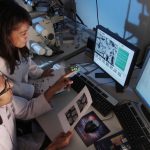
Singapore’s Pharmaceutical and Biotech Sector: What Roles and Skills Are Needed?
Quick share
Enjoyed reading this? View other related articles below:
Tips for new entrants joining the workforce

First Time Looking for Jobs? Read This Beginner’s Guide
2 minute read

Honesty in Interviews: Here’s Why it Matters
3 minute read

Feedback: Why You Should Ask for It
Advice for managing your mid-career development

3 Things Not to Say When Negotiating Salary for a Mid-Career Switch

Worried About Reaching Your Career Goals? Here Are Some Tips for Singapore’s Broad Middle Workers (PODCAST)

4 Positive Work Habits for Your Mental Well-being
Insights for mature workers to stay relevant

Career Confessions: What Retirement? He Chose to Embark on a Career Switch in His 60s!
14 minute read

Jobs to Consider in the Second Half of Your Career for Mature Workers, and the Skills You’ll Need

Knowledge Sharing: How and Why Guiding Younger Colleagues Benefits Your Career
Home / 25 Soft Skills That Will Make Your Resume Stand Out
Find more jobs like these at MyCareersFuture Job Portal

An initiative by Workforce Singapore
Whether you are a fresh graduate searching for a new entry-level job or a seasoned veteran considering a career switch, Workipedia by MyCareersFuture is the one-stop website for all your job application needs.

10 Most In-Demand Soft Skills to Put on Your Resume
L ong gone are the days when listing hard skills was the best (and oftentimes only) way to get your foot in the door at a prestigious company. While technical knowledge and training will always be important, soft skills (or essentially personality traits) are becoming increasingly important to highlight on your resume. And it makes sense, as more companies prioritize work culture and, therefore, the personalities of those they’re hiring.
But which soft skills are the ones that standout the most on a resume? Using data from Indeed.com, CashNetUSA scoured job ads for 46 predetermined soft skills to find the ones that appeared the most on high-paid jobs that surpassed the 75th percentile of wages in America’s most populated cities as well as each state. These are the soft skills that came out on top.
10. Resilience
Percentage of highly paid jobs requiring the skill: 34.29%
Resilience is a soft skill that highlights your ability to handle stress and challenges that come up at work.
A good example of how to add this to your resume could be, “Showed resilience when leading a team after budget cuts by still delivering work on time and within scope.”
* Data comes from a January 2024 report released by CashNetUSA .
9. Financial Management
Percentage of highly paid jobs requiring the skill: 38.24%
If you’ve ever been in charge of a budget of any size, you can say that you have financial management skills.
For instance, something like “oversaw the financial management of the freelance budget” could work if you hired contractors for a specific project.
8. Innovation
Percentage of highly paid jobs requiring the skill: 39.24%
Sure, this one makes our eyes roll a bit, too, but in today’s fast-paced world, innovation is key. No one wants an employee that stays stagnant or, worse, digs their heels in at the slight mention of change.
You know who’s not stagnant? Someone who “excelled at brainstorming and ideation in the innovation process for [fill in project name].” You get it.
7. Emotional Intelligence
Percentage of highly paid jobs requiring the skill: 43.11%
We’re actually pleasantly surprised with this one. After all, we didn’t think corporations necessarily had it in them to care about this.
Jokes aside, having emotional intelligence is something that makes a good team member and an even better manager. After all, it’s hard to resolve team conflicts without it. The more a company emphasizes a “harmonious work environment,” the more this soft skill will matter.
6. Mentoring
Percentage of highly paid jobs requiring the skill: 47.89%
Here’s another managerial skill that job ads like to use to weed out the haves from the have-nots when it comes to managers. Do you actually enjoy mentoring people or have you just fallen up the corporate ladder into a management position?
True leaders will make mentoring a priority and want to highlight it on their resume.
5. Critical Thinking
Percentage of highly paid jobs requiring the skill: 47.94%
“Critical thinking” or “problem solving” can be put in the same bucket as resilience. How did you handle a challenging situation at work? It’s even better if you have data to back up your claim.
Well, maybe you “demonstrated strong critical-thinking skills when analyzing financial reports and making forecasts for the following quarter.”
4. Presentation Skills
Percentage of highly paid jobs requiring the skill: 56%
Presentation skills are the nature of the beast when it comes to today's Corporate America. That's because lots of today’s high-paying jobs require working with cross-functional teams and being able to explain your work in easy, digestible terms.
Think someone on a data science team explaining their findings to a marketing team. Along with "presentation skills," you could also add the specific presentation tools or software you use for your presentations on your resume.
3. Persuasion
Percentage of highly paid jobs requiring the skill: 57.41%
Persuasion sounds rather seductive, but it's crucial when trying to get specific projects across the finish line.
It's also a term that's used a lot in marketing when talking about "persuasive marketing skills" required to communicate well with a customer audience.
2. Negotiation
Percentage of highly paid jobs requiring the skill: 58.26%
This skill goes back to business basics. Proper negotiation skills come in handy in any aspect of life, whether you're negotiating a $1 billion merger or whether or not your toddler can have dessert for breakfast.
That said, it's a skill that takes time to hone — which is why it's considered all the more valuable.
1. Strategic Thinking
Percentage of highly paid jobs requiring the skill: 64.77%
Strategic thinking is essentially a combination of innovation and critical thinking, but the best way to incorporate this keyword on your resume is by using the CAR (challenge, action, result) technique.
You could say something like, "Used strategic thinking skills by analyzing user engagement data and running an A/B test that resulted in increased engagement of 20 percent."
For more resume advice, check out "How to Make Your Resume Shine."


IMAGES
VIDEO
COMMENTS
How to put research on your resume. Follow these steps to add research skills to your resume: 1. Review the job description. Start by reviewing the job description closely and identifying whether the employer is looking for specific types of research skills. Make a list of all of the research-related skills they're looking for in a candidate. 2.
The first step is to collect all of the important details like the title of the research project, the location of the research project, the principal investigator of the project (if applicable), and the dates of the project. You will list these details much like you would list a company you have worked for in the past.
1 Choose relevant projects. One of the best ways to showcase your research skills is to include examples of projects that you have done or contributed to that involved research. These can be ...
How to List Research Skills on a Resume. Your resume is the best place to highlight your research experience and the value you could bring to your next role. The key here is to put your research skills in the right section so that they get noticed by the reader. You have no fewer than 7 options here: A dedicated research section
For research, summarize your accomplishments in a brief section. You should include a description of your role in the research, the topic that you were exploring, and some information about your findings. For example, _ Research Project, Economics Department, Dynamic University, Dec 2017 - Apr 20_20.
Scan the applicant requirements section for specific research skills. Cherry-pick the most relevant research experiences to include in your resume (yes, every resume has to be customized to the job description!). Include all your research directly in the sections of your resume that summarize your current and previous positions. If you can ...
List the publications in bullet points, including the title, date, and journal name. You can list academic publications more formally if you're applying to graduate school or seeking a role in academia. Related: Create a Resume Publications Section in APA and MLA. 6. Highlight research skills in the skills section.
There are a number of ways you can highlight research experience on your resume: In a dedicated section. In your work experience. In your education section. Listing research publications. In a projects section. In your skills section. In your resume summary.
To discover how to put research on your resume, consider following these steps: 1. Examine the description of the job opening. When writing your resume for a job opening, thoroughly review the job description to discover if hiring managers are looking for specific research skills. For example, in the job description for a laboratory scientist ...
Tip #4: Include Keywords. Use keywords from the job description in your resume. If they're looking for someone with "analytical skills," then use that phrase in your resume. If they don't ask for it specifically, then leave it out—but make sure to include other relevant skills. Typically, your resume will have to pass through a software ...
How to include research skills on your resume. Research projects require dedication. Being committed is a valuable skill for hiring managers. Whether you've had research experience throughout education or a former job, including it properly can boost the success of your resume. Consider how extensive your research background is.
Research skills are the ability to find an answer to a question or a solution to a problem. They include your ability to gather information about a topic, review that information and analyze and interpret the details in a way to support a solution. Having research skills is necessary to advance your career as they directly relate to your ...
There are 3 options when it comes to placing your research experience on your resume - a dedicated "Research Experience" section, your "Experience" section, or in a separate "Publications" or "Presentations" section. Wherever you decide to showcase them, ensure to include details like project title, duration, methodology, or results.
How to create a resume for a researcher. Here are steps you can take to create a resume for a position in research: 1. Include a heading. Your resume's header is the first section and includes your personal information and contact details. Your contact information includes your official name, telephone number, email address, and city and ...
Use professional language, as most files are submitted electronically — the reviewer will see if you named a file "Better Resumé". Include your first and last name and the title of the position in the file name. ex: Jane Doe Resumé - Biochemistry REU, UT Austin. This will ensure that the reviewer knows who you are and what you are ...
You will want to show that you have this kind of experience and also show off the skills that you have used/developed in your research position. What You Need to Include Its important to summarize the basic details of each position on your resume so that whoever reads it understands what each position was before they even read your bullet points.
When applying to a research and development position, follow these steps to create your research and development resume: 1. Write your contact information. Including your contact information in an easy-to-identify format makes the job of the hiring professional reading your resume easier. Place your name at the top of your resume in the largest ...
1. Highlight your research skills. 2. Showcase your research projects. Be the first to add your personal experience. 3. Include your publications and awards. 4. Customize your resume for each ...
How to put undergraduate research on a resume to achieve just that: Re-read the job ad or announcement. Identify all the skills and duties mentioned there. Think of times you've used those skills to impress employers and professors. Write resume bullet points using quantifiers and action verbs describing those times.
Then focusing on academic skills and knowledge will be essential. On the other hand, if you're applying for a professional research position, the skills you'll use on the job, like organized information handling, will be more relevant to include. Here are some of the top skills for undergraduate research resumes.
The most common skills and keywords we found on Research resumes and job postings were MATLAB, Python (Programming Language), C++, LaTeX, R (Programming Language), Research, Machine Learning and C (Programming Language). Skills like Consumer Behavior, Marketing, Agile Methodologies, Regulatory Submissions and Design Control also appeared on ...
Avoid using graphs, images, or unusual formatting. Include keywords from the job description. Look for common industry terms, specific skills, and qualifications mentioned in the job posting and add them to your resume. Proofread for spelling and grammar mistakes. Include a detailed skills section near the top of your resume.
In your skills list, prove you've got them, like this: Research: conducted deep research into 15 unique project topics as directed by professors. Commended by 3 professors for quality of research. Data entry: Performed regular data entry tasks on first-year student project grades for 400+ students.
9. Problem-solving. Problem-solving is one of the best skills to put on a resume with no experience because it shows your ability to tackle challenges and find solutions. Since most professions involve facing certain challenges sooner or later, employers highly value candidates with this capability.
8. Administrative support. Administrative skills encompass a range of abilities, including scheduling tasks, meetings and appointments, data collection and entry, answering emails, organizing employee paperwork, and managing office supplies. These skills are transferable across any type of industry or company.
Empathy. Leadership. Teamwork. The best skills to put on a CV vary by job type, career level, education and other factors. For example, the skills most important for a commercial truck driver will differ from those of a marketing manager.
Soft skills have become increasingly important in the job market. Below is a comprehensive list of essential soft skills that you can highlight on your resume: 1. Communication. Communication skills refer to an individual's ability to convey information verbally and in writing clearly.
Here are 10 examples of the best resume skills employers may be seeking: 1. Active listening skills. Active listening refers to the ability to focus completely on the person who you're communicating with. Active listening helps you to understand their message, comprehend the information and respond thoughtfully.
Validate customer concerns and address negative feedback promptly and efficiently. Meet and exceed sales targets and goals. The bolded keywords represent some of the active listening skills that a candidate might benefit from emphasizing on a resume for this role. Pro Tip.
Presentation Skills. 3. Persuasion. 2. Negotiation. 1. Strategic Thinking. For more resume advice, check out "How to Make Your Resume Shine." Soft skills (or essentially personality traits) are ...